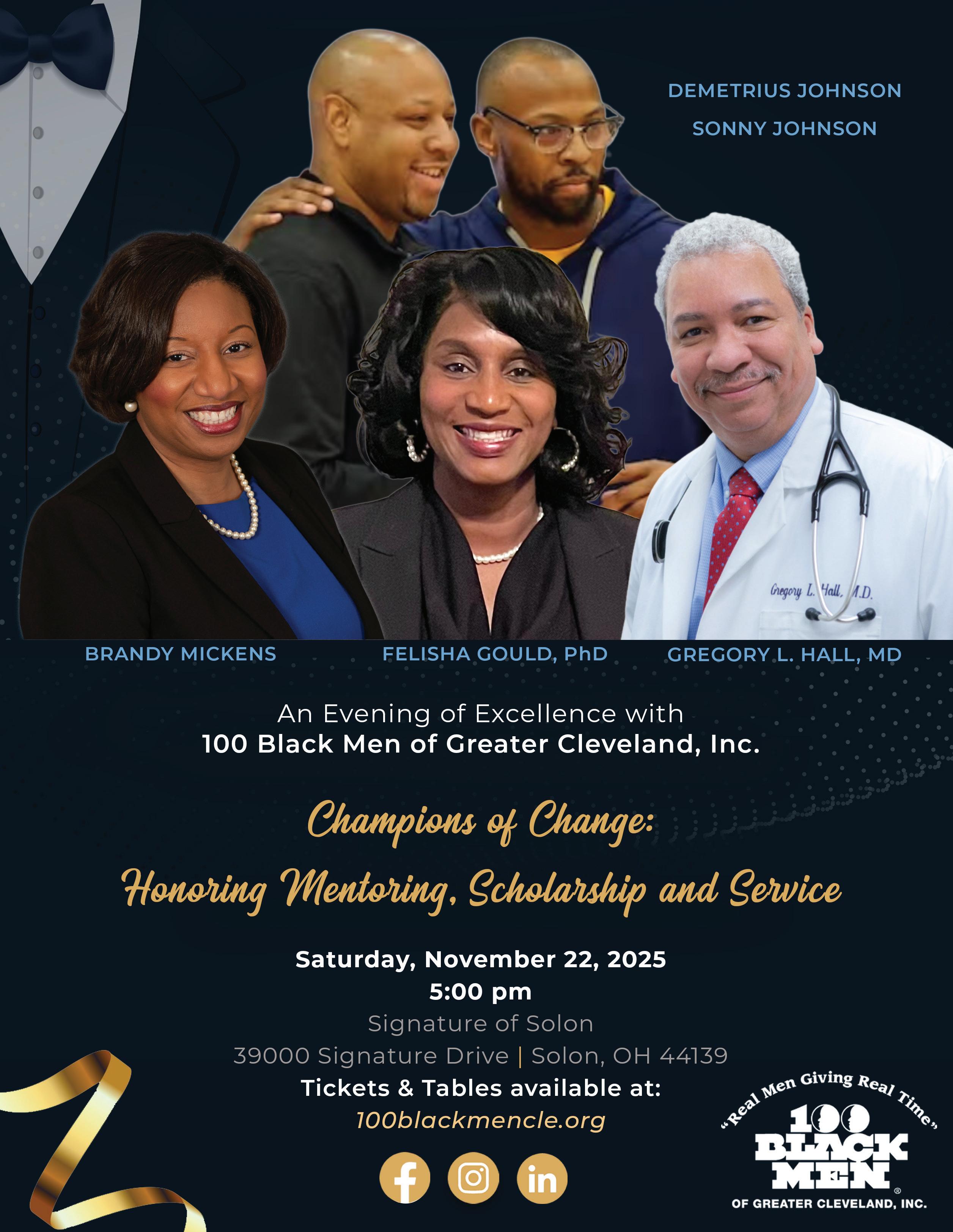
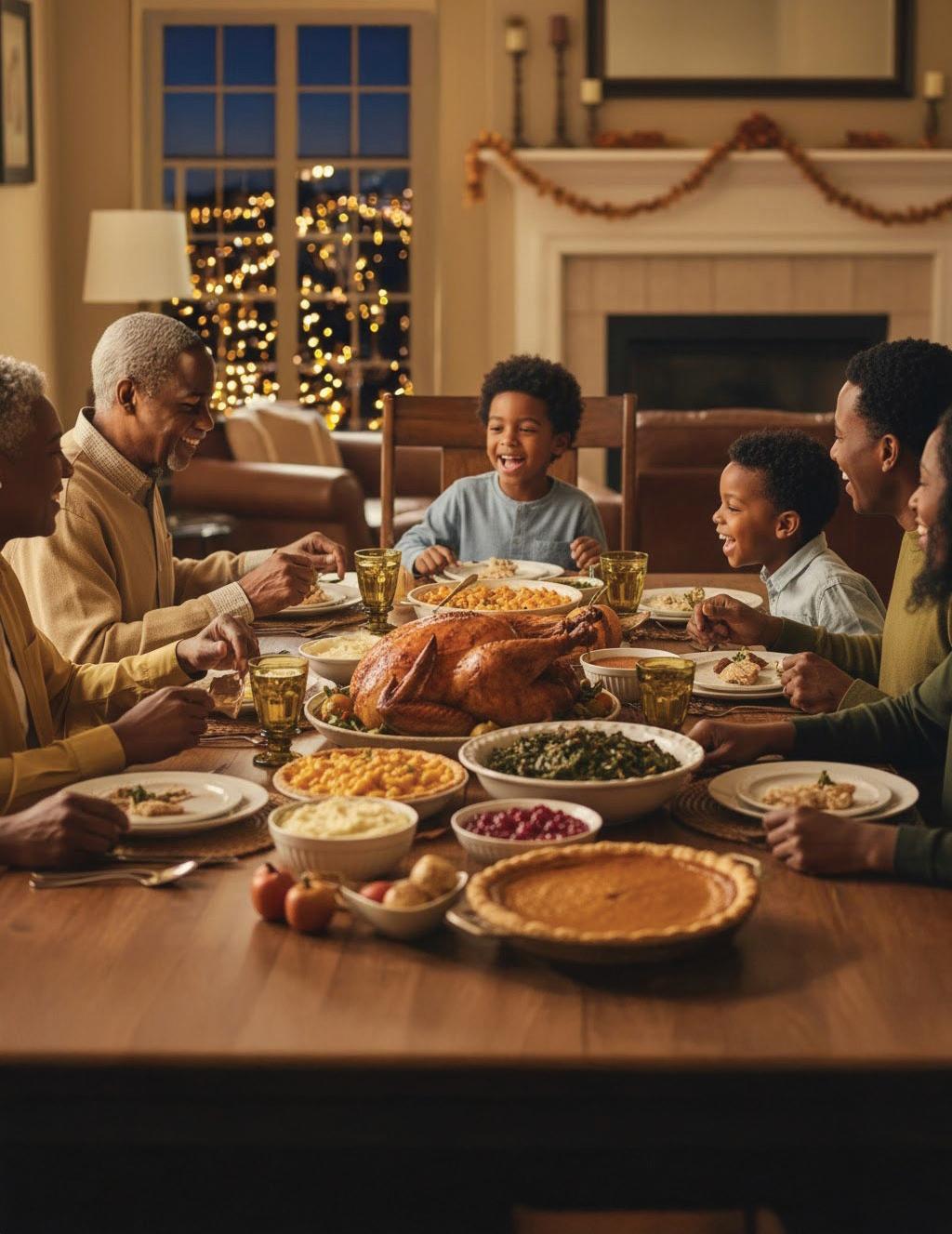
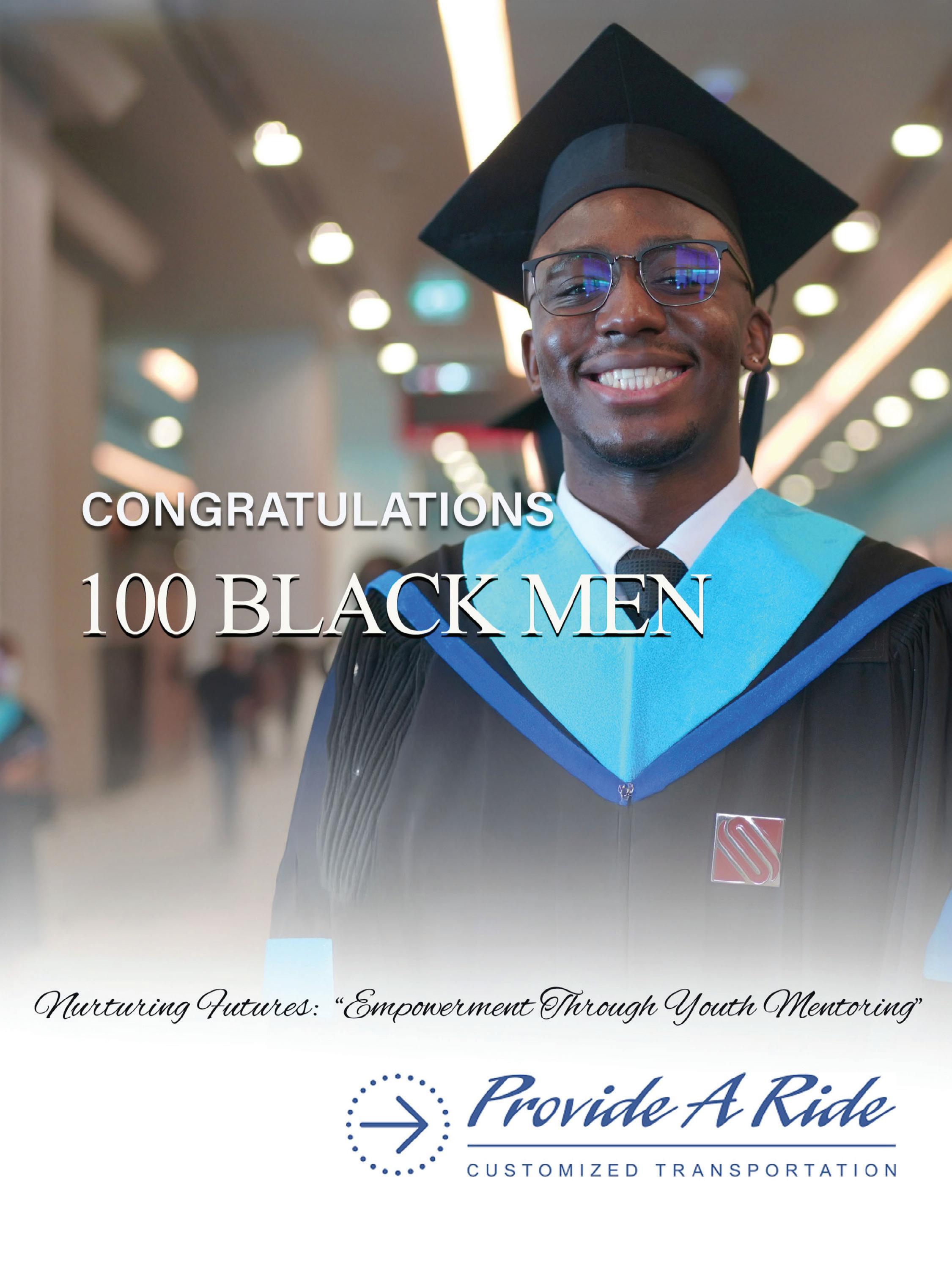







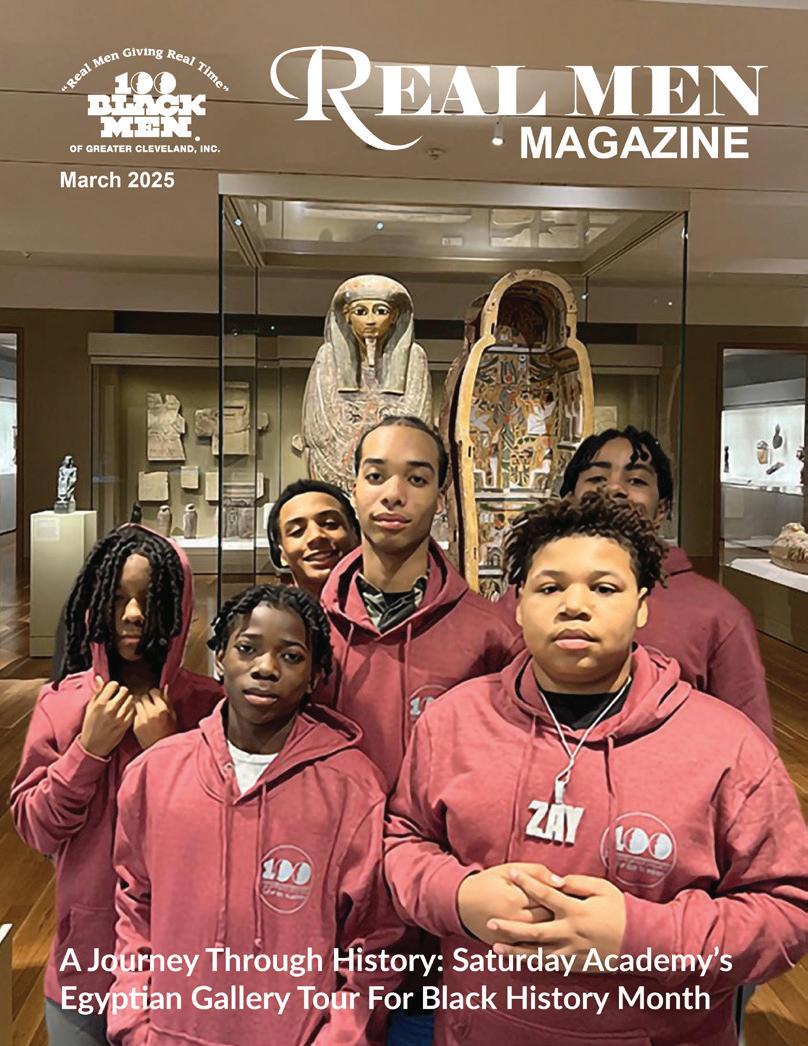


Gregory Lockhart. Chairman
James W. Wade III Vice - Chairman
Robert L. Bankston Secretary
Terrence McWhorter Treasurer
Grady Burrows Director of Programs
Anthony Peebles Director of Development
Milton H. Jones Jr. National Chairman
Andre Givens Midwest District Representative
James W. Wade III Communications/PR
James W. Wade III
Managing Editor
Layout & Design JWW Media Entertainment Co.
Photography
James W. Wade III
Brian K.
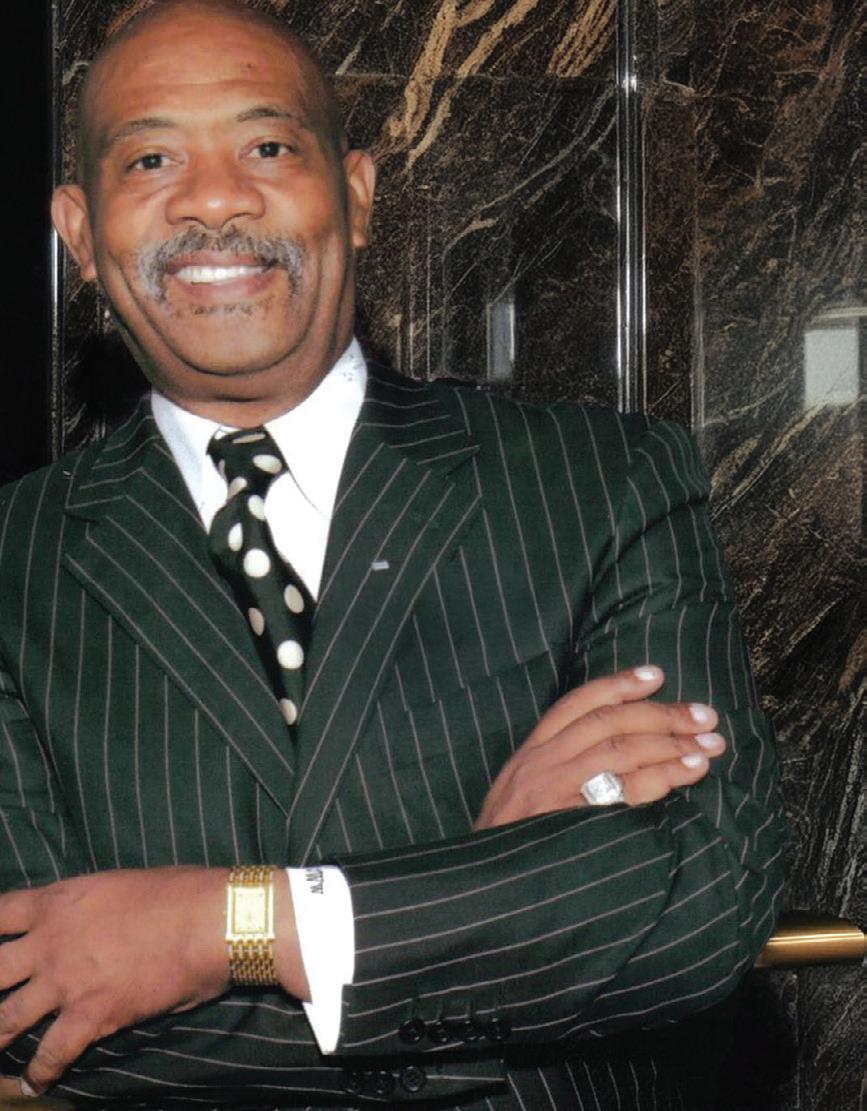
As we enter November, we are reminded of the true spirit of gratitude — not only as a feeling but as a force that inspires action. Gratitude is more than simply saying “thank you.” It is a way of seeing the world, recognizing the blessings we have, and understanding our responsibility to share those blessings with others. For the 100 Black Men of Greater Cleveland, Inc., gratitude is at the heart of everything we do, and your support is the fuel that drives our mission.
When we look at the young men we mentor, the communities we serve, and the brothers we stand beside, we are reminded that we are part of something greater than ourselves. Each act of service, each word of encouragement, and each hour spent mentoring are reflections of the gratitude we hold for the opportunities life has given us — and your commitment to giving back in return is what makes our work possible.
Giving back is how we turn gratitude into impact. Whether it’s donating food to families in need, volunteering at the Saturday Academy, or simply being present for a young man who needs guidance, every gesture matters. These moments remind us that leadership is not just about position or power — it’s about purpose and compassion.
As we gather with family and friends this Thanksgiving season, let us take time to reflect on the many ways gratitude has shaped our lives. Let us also challenge ourselves to extend that gratitude beyond the table — into our communities, our schools, and our daily interactions.
Genuine gratitude does not end with words; it moves us to act, to serve, and to uplift others. That is the transformative power of gratitude and giving back — it connects us, strengthens us, and reminds us that together, we can make a lasting difference, no matter how big or small our contributions may seem.
“Life’s most persistent and urgent question is, ‘What are you doing for others?’” — Dr. Martin Luther King Jr.
With gratitude, James W. Wade III

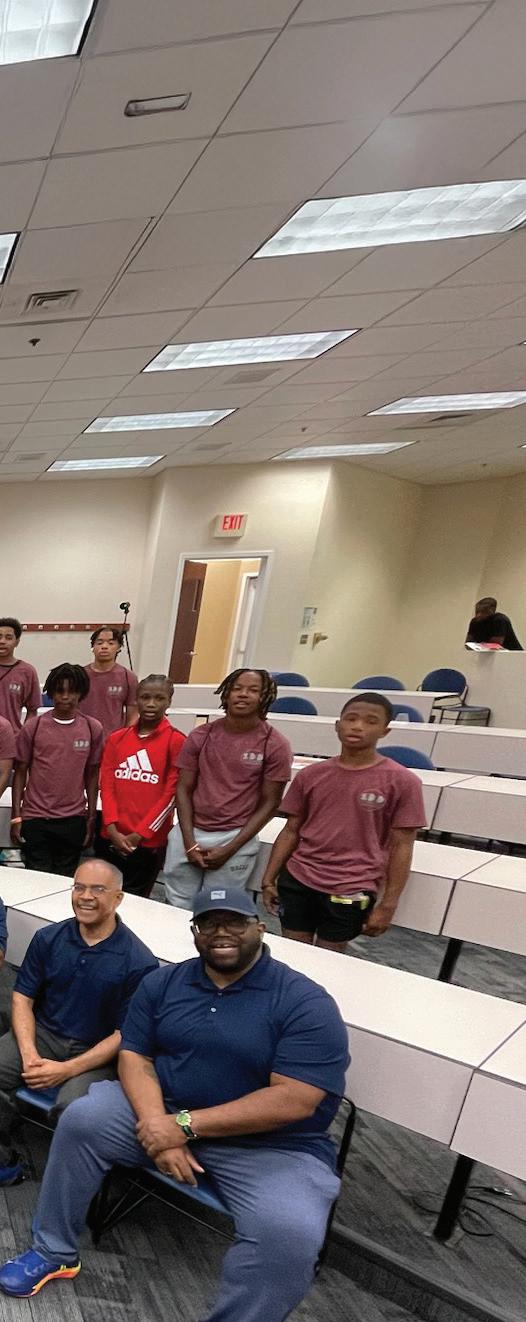
The 100 Black Men of America, Inc., is not just a leading African-American-led mentoring organization, but a beacon of hope for the African American community. We believe that every African American should have the ability to create the life they’ve always wanted, and that’s what The 100 Black Men of America, Inc. is making possible.
Our commitment is unwavering. We strive to personify the type of people our children will look up to and emulate, embracing our immense responsibility to our mentees and our communities. We provide these children another choice by being around like-minded individuals with similar aspirations and goals, ensuring a brighter future for African American youth.
As The Network of 100 Black Men of America, Inc. has expanded, we have welcomed more companies and developed new programs to better serve our mission. Our focus areas, known as the 100’s Four For The Future, include mentoring, education, health and wellness, and economic empowerment. These areas guide our efforts to provide the education and empowerment necessary to transform the lives of the children we serve.
Through the expansion, we’ve created 100 Black Men Chapters that deliver unique programs that address specific needs in local communities. Through 57 years of testing, we’ve created the 100’s successful model—a proven blueprint for mentoring and developing young people into future leaders by surrounding them with a positive network and giving them the opportunity that they may not have thought was possible.

Far too often, we watch from the sidelines while our young people struggle with challenges that we as adults could help them overcome. We see them wrestling with issues of identity, education, violence, peer pressure, and opportunity. We know the obstacles are real, yet too many of us choose silence or feel indifferent.
Every day, a young person is waiting for guidance, encouragement, or simply a positive voice to remind them that they matter. When we choose to do nothing, when we leave the work to “someone else,” we miss the chance to shape the future of our community. But when we speak up, when we offer direction, when we pitch in, even in a small way, we can make a BIG difference.
This is not about one mentor, one teacher, one parent or one volunteer. It’s about building a community that works together rather than as individuals acting alone. One person can plant a seed, but it takes us working collectively to nurture growth. Alone, our impact may feel limited or isolated. Together, our impact becomes transformational.
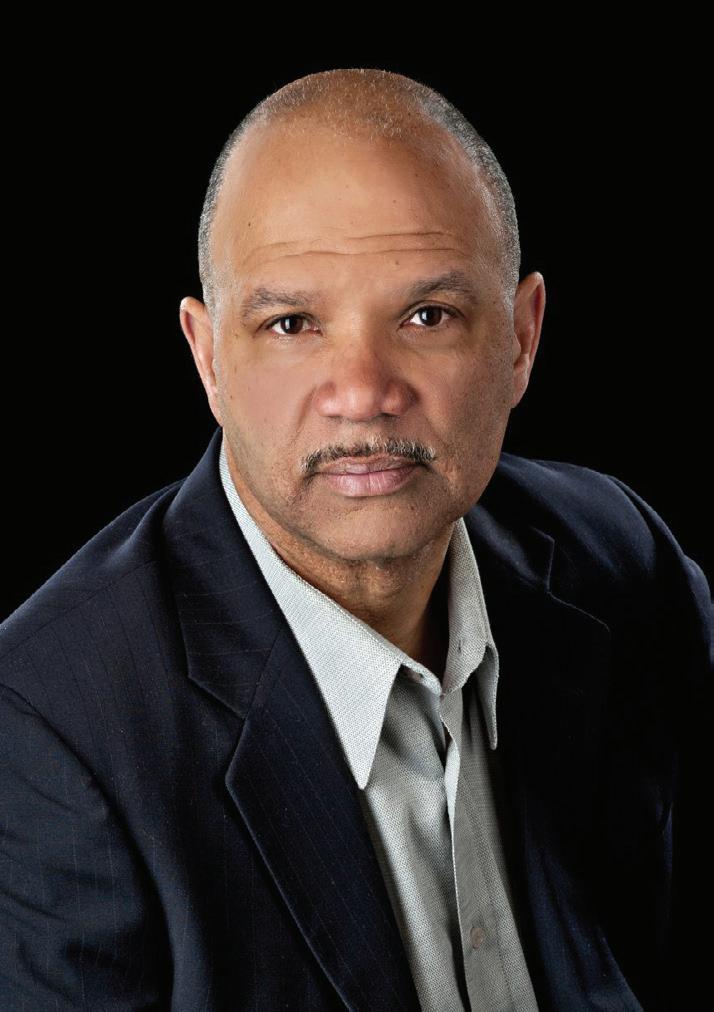
Our youth are not looking for perfection. They are looking for presence. They are looking for people who care enough to show up consistently, listen, and lead by example. Every time an adult chooses to engage—whether by volunteering, mentoring, coaching, or simply showing kindness—we send a message that our young people are worth the investment. We show them what often times they cannot see, that they are not invisible, that they belong, and that they have a future worth striving for.
The choice before us is simple: we can sit on the sidelines and hope someone else steps in, or we can be the ones to rise, speak, and act. Doing what you’ve been doing keeps things the same. The choice to act creates change.
Let us remember: when we work together as a community, there is no barrier strong enough to keep us from lifting up our youth. As we often say, they are our future, but the men of the 100 Black Men of Greater Cleveland, Inc. realize they need us today.
Gregory Lockhart Chairman, 100 Black Men of Greater Cleveland,
Inc.
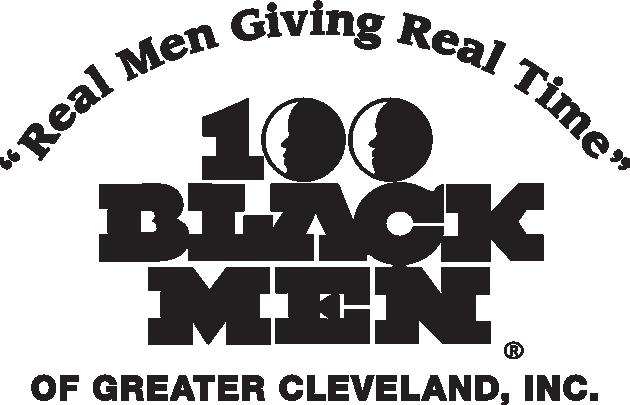
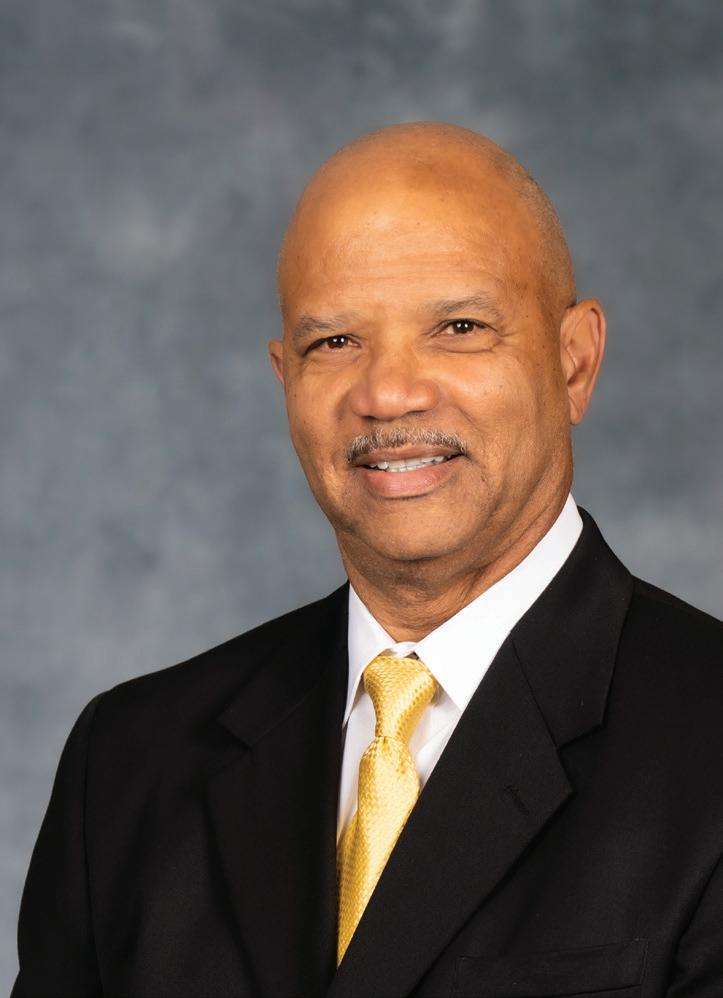

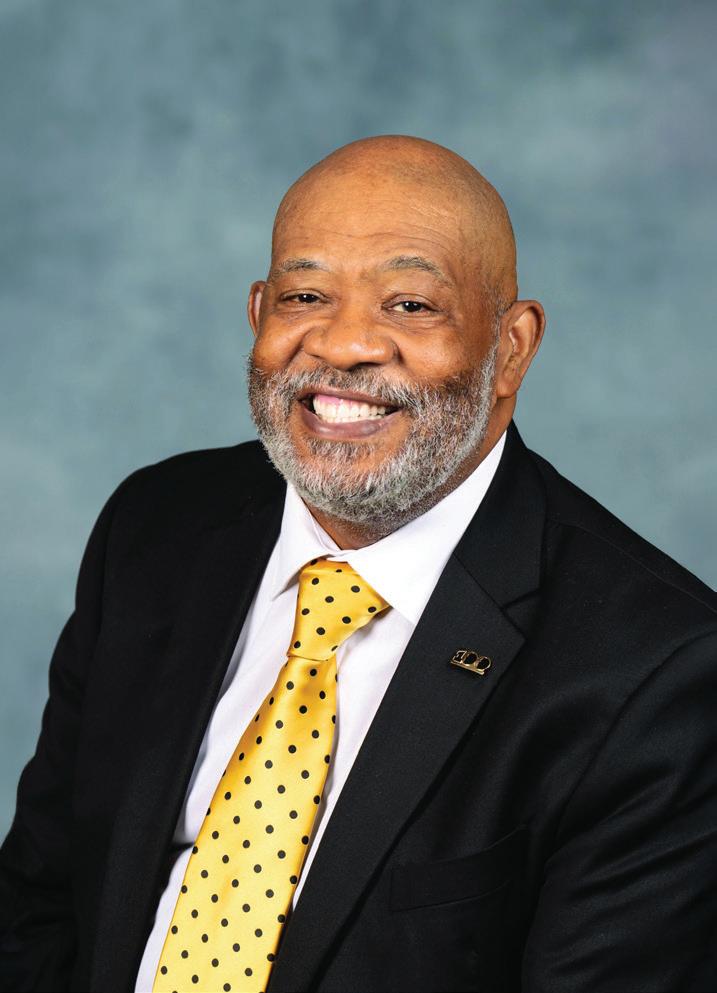
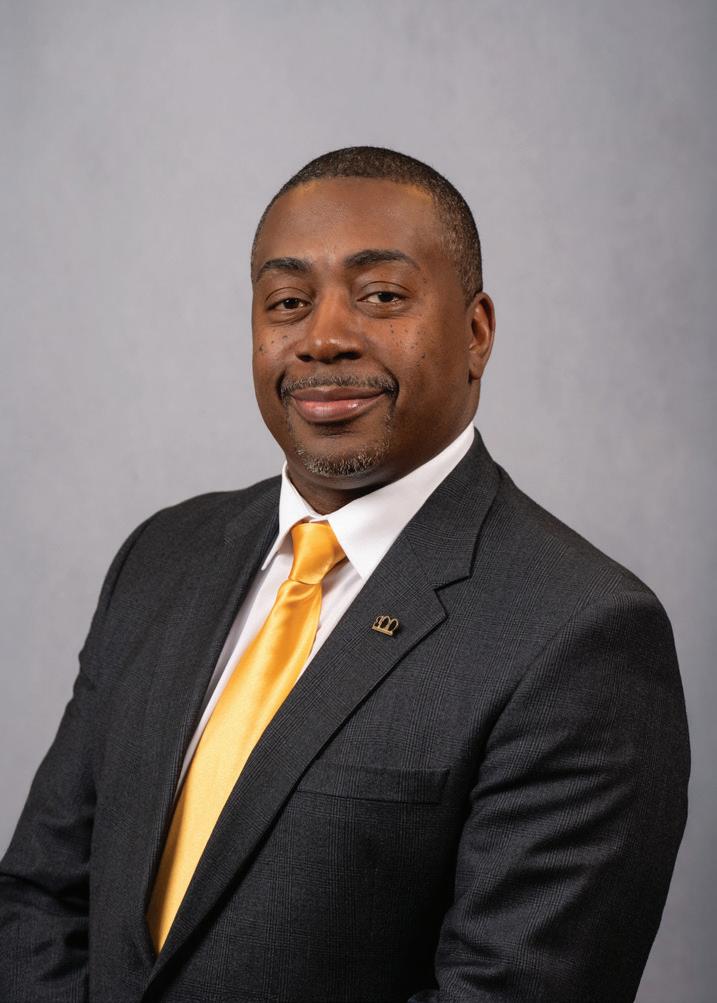
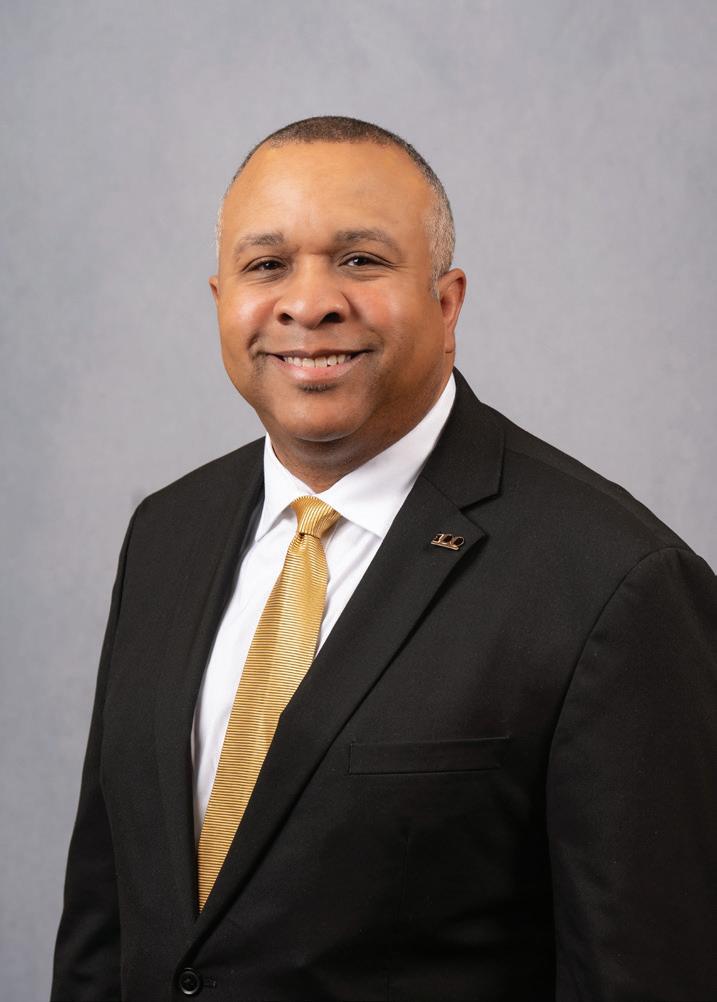
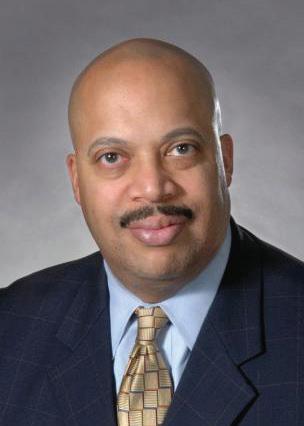

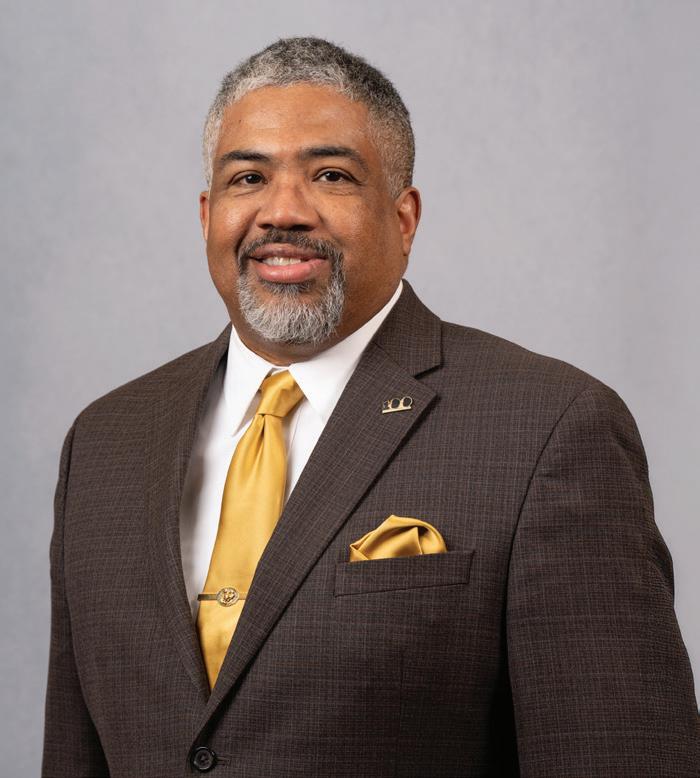

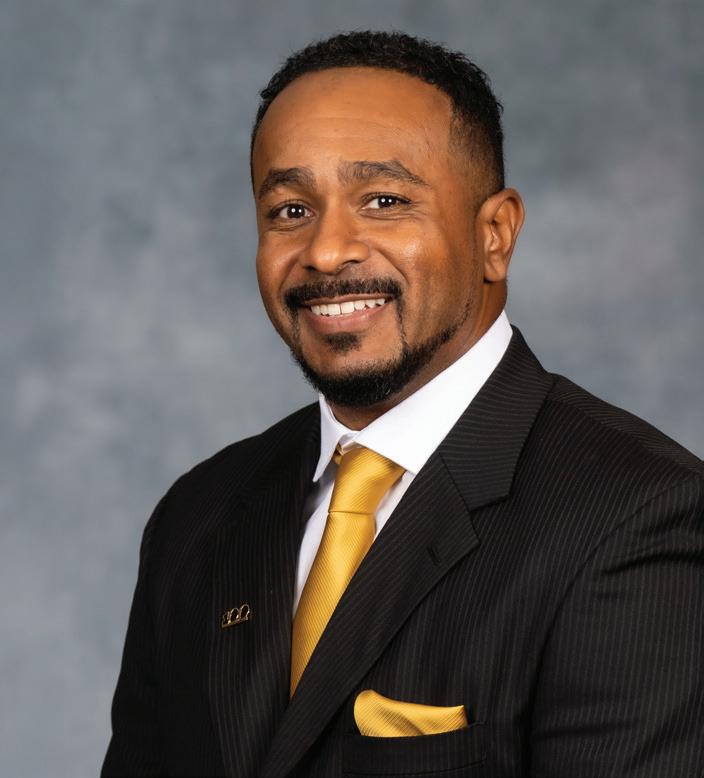

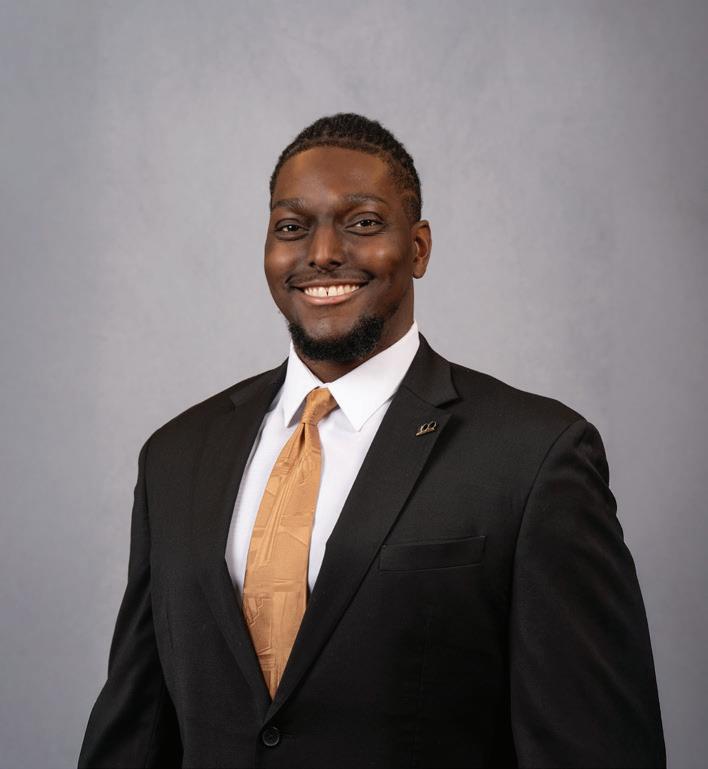
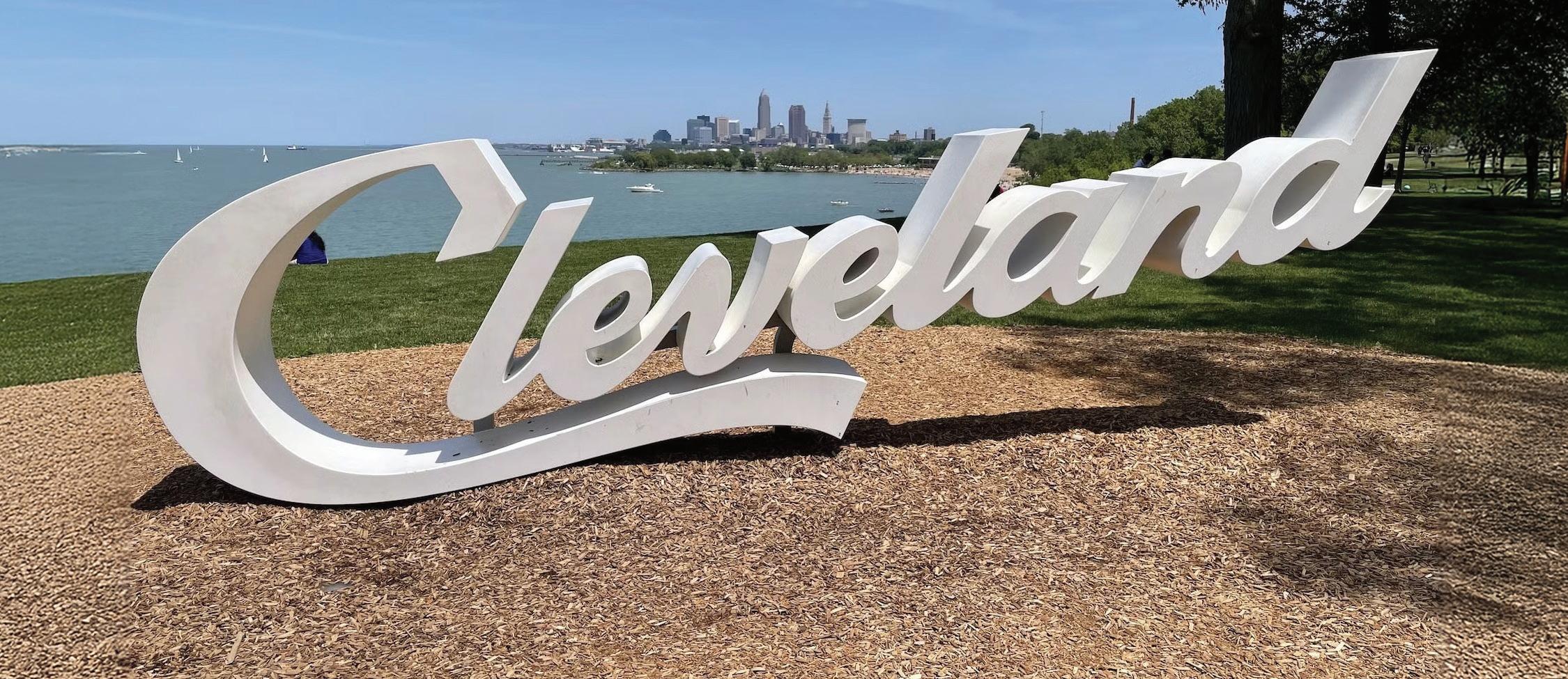
Gregory Lockhart Chairman
James W. Wade III Vice - Chairman
Robert Bankston Secretary
Terrence McWhorter Director of Finance
Grady Burrows Director of Programs
Anthony Peebles Director of Development
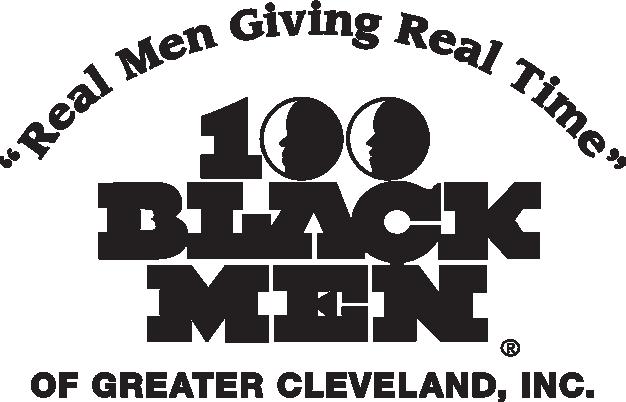
Mayor Michael Booker
Christopher Howse
Darian Johnson
Glen Shumate
David Taylor
National Chairman
Milton H. Jones Jr.
Midwest District Rep Andre Givens
Director of Communications
James W. Wade III
Economic Empowerment
David Taylor - Chair
James Ferguson - Co Chair
Education
Brett Horton
Health & Wellness
Robert Bankston - Chair
Lloyd Totty - Co Chair
Mentoring
Darian Johnson - Chair
Dr. Ernest Smoot - Co Chair
Membership
Chair - Vacant
James W. Wade III - Co Chair
Scholarship
Tyson Mitchell
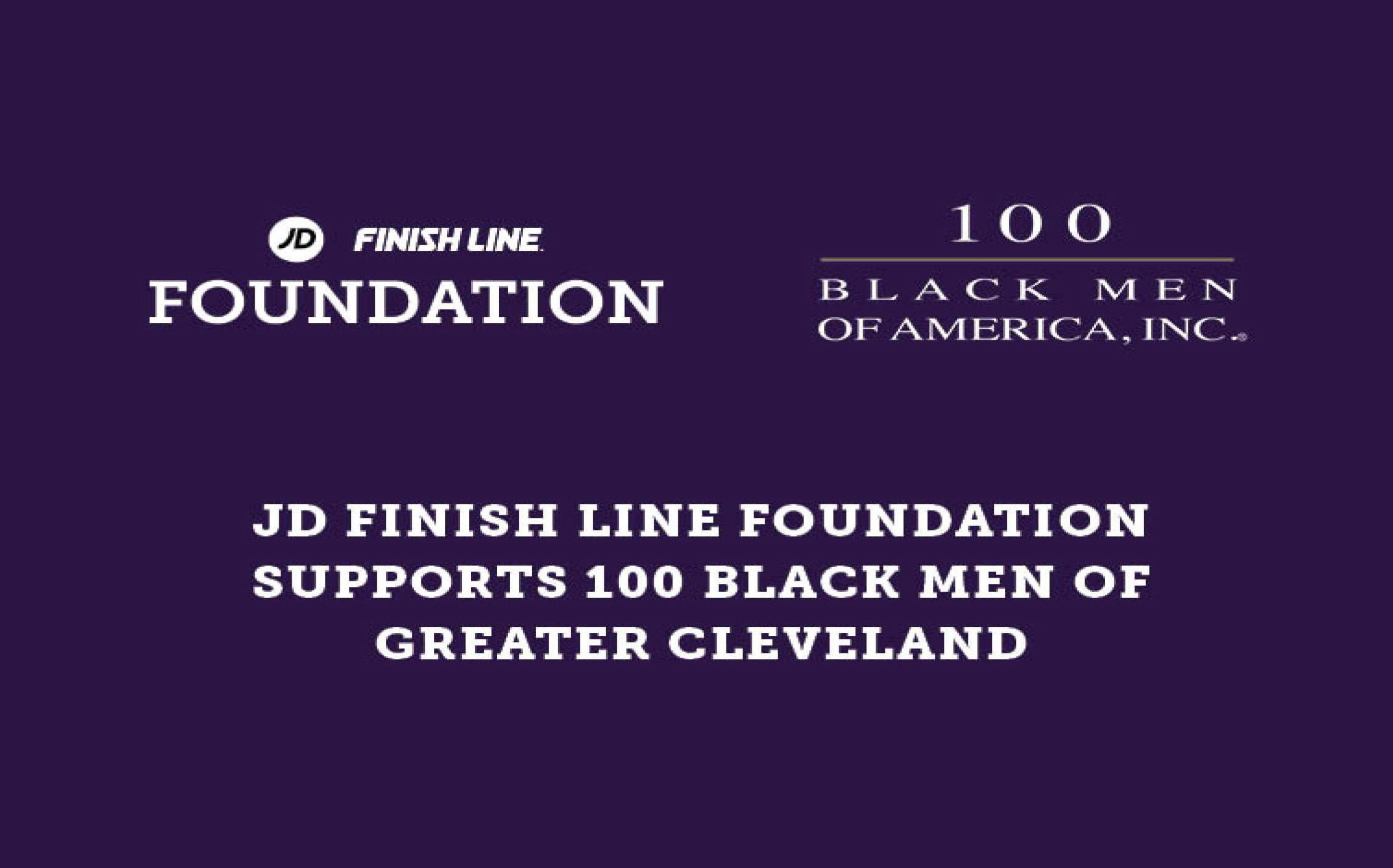
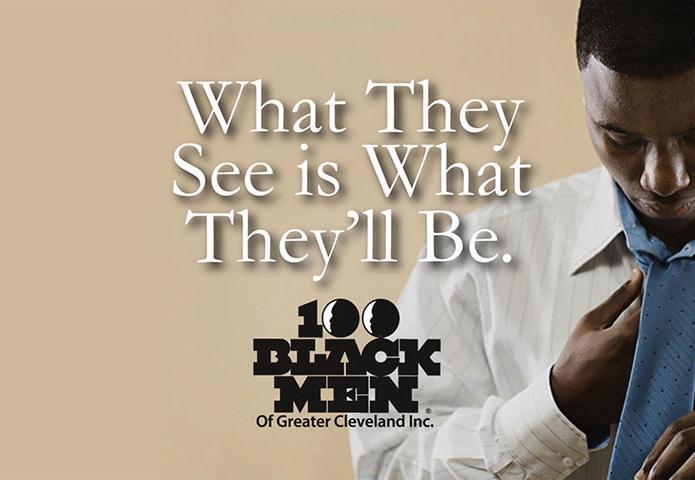
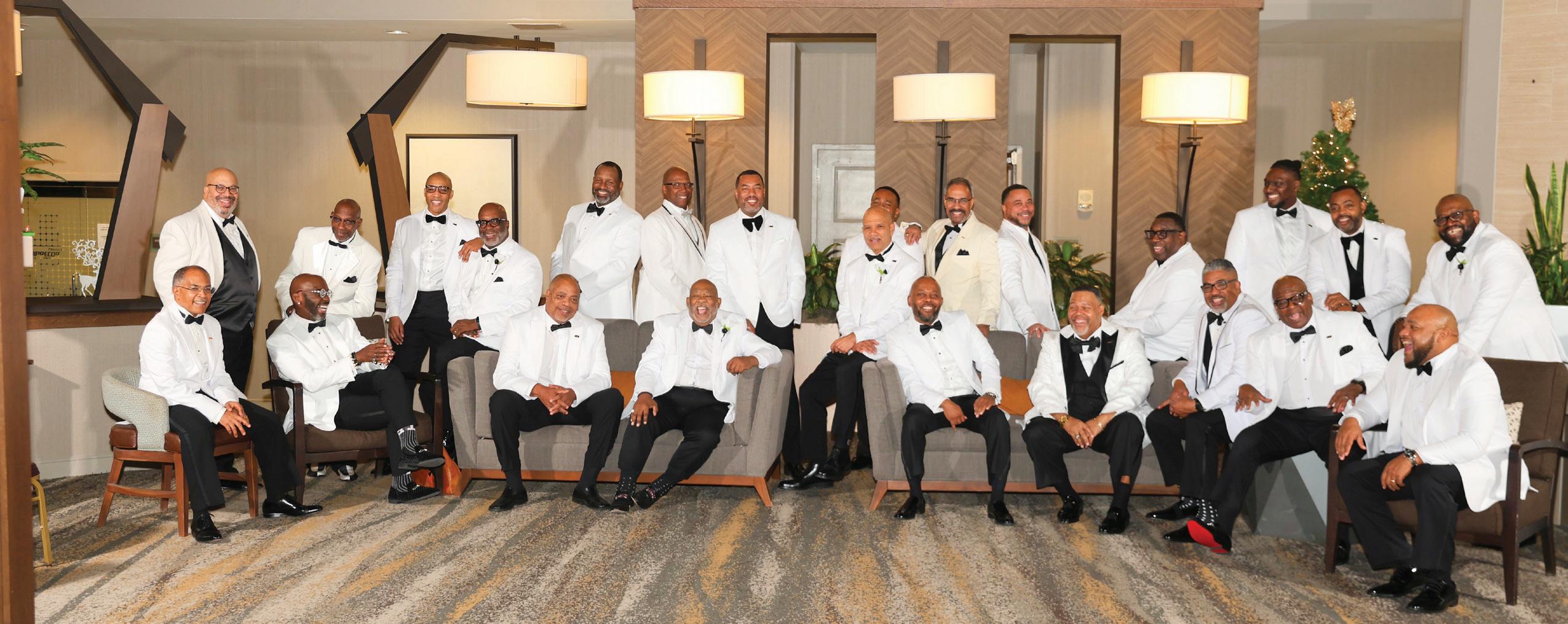
The history of the 100 Black Men of Greater Cleveland is a testament to the power of vision and collaboration. It all began with a pivotal moment when Michael Nelson, a visionary leader, convened a historic meeting. This gathering brought together individuals who represented powerful political factions, including Congressman Louis Stokes, former City Council President George Forbes, and the man who defeated George for Mayor, Michael R. White. The location of this momentous meeting was kept a secret until the day of the event, adding to its intrigue and significance. This history is not just a story, but a legacy that has shaped the community and inspired generations to come.
A date was set, and Nelson invited a number of his friends, including Larry Hines, Gregory Clifford, Curtis Griggs, Tony Smith, Luther Towers, and Julius Singleton, along with Stokes’ rep, Ron Adrine, Forbes’ rep, Daryl Fields, and White rep, Nate Gray, to meet with Chairman Dortch and Roosevelt Adams. The meeting was held at the now-closed Eloise’s Restaurant, located on East 79th Street and Carnegie. The National Headquarters approved Cleveland to be established in 1997 and recognized as an entirely fledged chapter.
These guys were familiar with the 100 through business, political, or family connections. After listening to the very impressive Thomas Dortch and engaging in approximately an hour of discussion, the decision was made to incorporate formally, establish a dues structure of $250 annually, and begin recruiting members. In 1997, the 100 Black Men of Cleveland was established.
The first significant event was a rollout at the Cleveland Clinic, where over 90 men committed to join the cause, with about 70 of them paying their dues. Mayor Michael R. White, a staunch supporter, pledged to purchase 100 copies of the renowned motivational speaker George Fraser’s book, ‘Success Runs in Our Race,’ for each member. George Frazer, who graced the opening event with his presence, generously autographed each member’s copy, symbolizing the dedication and support of the early members.
The next major event was a fundraising gala featuring the late Phylis Hyman, a nationally known recording artist. The event was orchestrated by the dynamic Richard Johnson, a significant internet influencer in today’s social media world. Held at the prestigious Marriott Hotel in Cleveland, the gala was not just a success but a resounding triumph, underscoring the impact of the 100 Black Men of Greater Cleveland in the community.
The funds raised by that first gala supported the Cleveland chapter’s version of the National 100’s Four For The Future programs: Health/Wellness, Economic Development, Education, and Mentoring. Larry Hines was our first Program Director, assisted by Curtis (Griggs). The parentheses are intentional; that’s how Curtis spelled his last name.
The 100 would continue to grow its brand in Cleveland. The group coordinated mentoring programs in numerous schools, including Daniel E. Morgan Elementary School, Cleveland East Senior High School, John F. Kennedy Senior High School, East Cleveland Shaw Senior High School, Mound, and Warrensville Heights Senior High School. The 100 also held a Saturday morning mentoring program at its offices in Cleveland’s Shaker Square complex. The numerous programs included a reading program at Daniel E Morgan and a stock market competition at East High School. One of the highlights of our plan was the success of our East High Stock Market Challenge team, which traveled to Atlanta and took on some of the nation’s most prominent schools, finishing a highly respectable 3rd out of the scores of schools that competed.
In 2022, a class of 22 new members joined, a testament to the organization’s continued growth and influence. As we look forward to 2023, we celebrate twenty-five years of impactful service. After seven chairpersons and numerous galas, the chapter continues to thrive, mentoring men in schools such as Wade Park and the Kenneth Clement Boys Leadership Academy, among others. Our journey is marked by numerous achievements, from successful galas to impactful mentoring programs, all of which contribute to the betterment of our community.
2024 under the dynamic new leadership of Chairman Gregory Lockhart and Vice Chairman James W. Wade III, the 100 Black Men of Greater Cleveland proudly re-instated the impactful Saturday Academy at Cuyahoga Community College’s Eastern Campus. This revitalized program has become a cornerstone of our mission, offering young men a safe, structured, and inspiring environment to learn, grow, and lead. Alongside its return, we also introduced a variety of innovative new programs and engaging activities designed to broaden opportunities, strengthen mentorship, and further empower the next generation of leaders.
2025 as we look to the future, we are excited about the opportunities that lie ahead. With new Leadership and a renewed commitment to our mission, we are ready to take on the challenges of the next decade. We look forward to continuing to make a powerful impact, helping us live out our mission of mentoring, educating, and empowering the next generation. This year, we accomplishedso much with the membership giving so much of their time to make the chapter great: We expanded and enriched our Saturday Academy, offering transformative sessions in mentoring, health & wellness, economic empowerment, and Education. This growth is a testament to our commitment to providing comprehensive support and guidance to our mentees, and we are excited about the positive impact this will have on their lives.
Launched Well Connected on Wednesday, bringing families and mentees together monthly for fitness, wellness, and fellowship. Hosted signature community events, including the Drive Cleveland Golf Outing, Family Picnic, and Walk a Mile with a Child. Honored outstanding leaders and partners at our Sponsor & Honoree Reception and prepared for our 2025 Scholarship & Awards Gala: Champions of Change. Strengthened collaborations with various community partners, expanding opportunities for and to our youth in sports, STEM, financial literacy, and college readiness. Our STEM students won second place at the 100 Black Men National Conference in New Orleans. We continued to uplift the voices and celebrate the achievements of our community through Real Men Magazine, expanding our platform as a powerful tool for storytelling and inspiration. Throughout 2025, we demonstrated the very essence of true brotherhood, leadership, and service. This year stands as a testament to what can be accomplished when we come together, united by purpose and driven by progress.

Judge Ronald Adrine
Chief Magistrate Gregory Clifford,Retired
Darrell A. Fields
Nate Gray
Curtis (Griggs)
Larry Hines*
Robert L. Bankston
Dr. Michael Baston
Lucien Blackwell
Mayor Michael Booker
Anthony Brown
Grady Burrows
Honorable Gregory Clifford
Lonnie Coleman
Raphael Collins
Dr. Michael Copeland
Brandon Curry
Pastor Robert Dix
Lamont Dodson
Dr. Ronnie Dunn
Judge Michael Nelson
Julius Singleton
Anthony (Tony) Smith*
Luther Towers
James Ferguson
Darrell Fields
Duane Griffin
Curtis (Griggs)
Jeevon Harris
Brett Horton
Chris Howse
Larry Jewett
Darian Johnson
Roz Kennon
Gregory Lockhart
Terry Maynard
Terry McWhorter
Tyson Mitchell
Judge Michael Nelson - Retired
Judge Charles Patton
Anthony Peebles
LaRese Purnell
Rev. Randy Reed
Steven Robertson
Glen Shumate
Steve Sims
Jermaine Smith
Ernest Smoot
Robert Solomon
David L. Taylor
Andre Thompson
Lloyd Totty
James W.Wade III


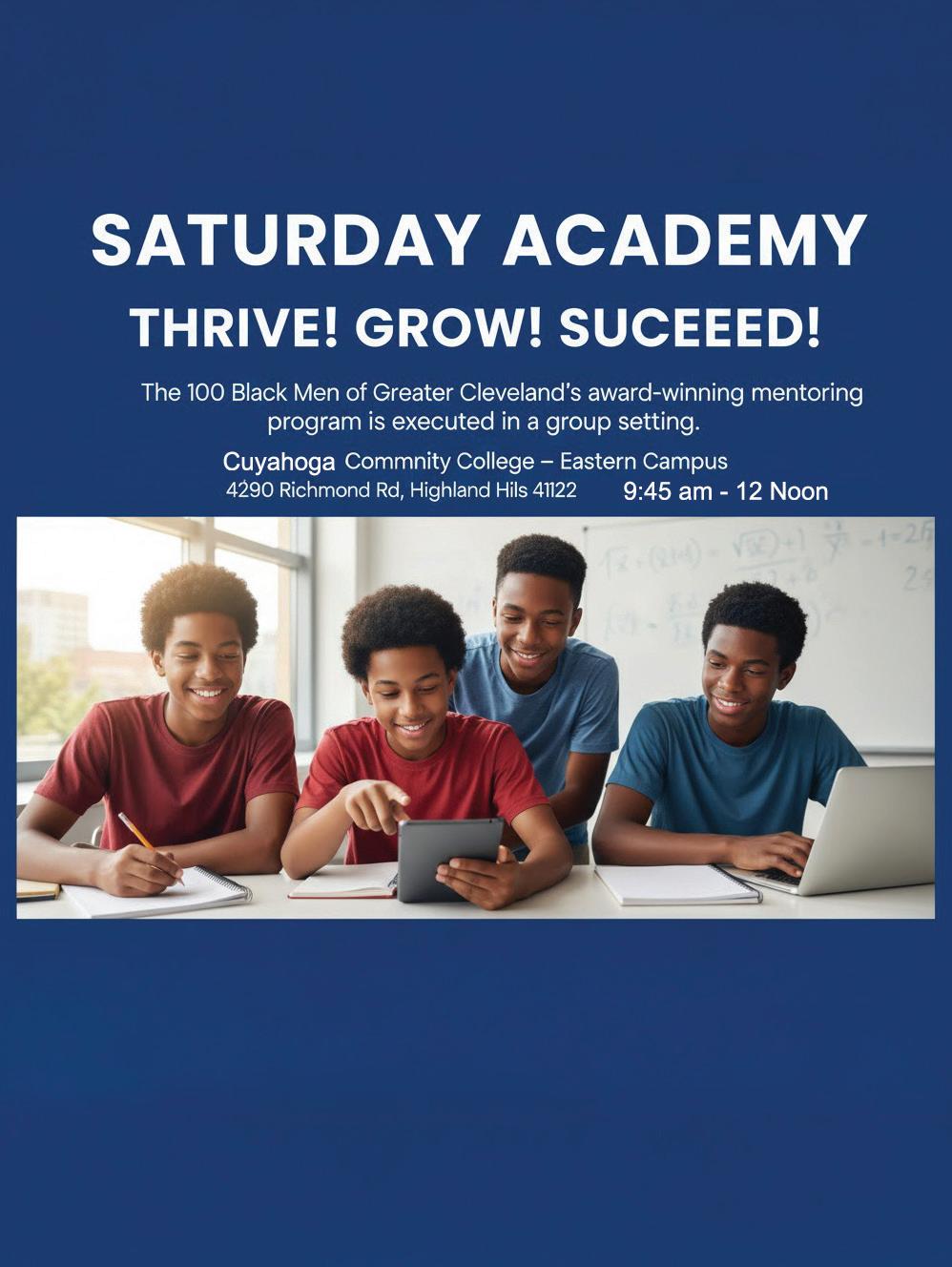
Program Highlights:
Sessions on: Mentoring • Education
• Health & Wellness • Economic Empowerment
•Provide mentoring for personalized guidance and support
•We promote leadership and opportunity through expert speakers and exposure to field trips
•Interactive workshops to enhance skills and explore career pathways
Scan QR Code to Sign Up


“What They See Is What They’ll Be®”
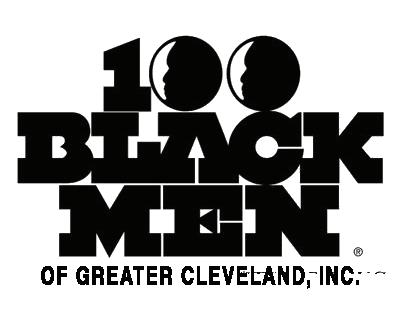

An Evening of Excellence with the 100 Black Men of Greater Cleveland, Inc. “Champions of Excellence: Honoring
Scholarship, and Service”
The 100 Black Men of Greater Cleveland, Inc., a chapter affiliate of the 100 Black Men of America, Inc., is proud to announce its Annual Gala — An Evening of Excellence on Saturday, November 22, 2025, at the Signature of Solon, located at 39000 Signature Drive in Solon, Ohio, beginning at 5:00 p.m.
This inspiring evening promises to be one of elegance, purpose, and celebration. It will highlight the organization’s commitment to mentoring, leadership, and community service while honoring outstanding individuals who have made meaningful contributions to the Greater Cleveland community. Guests will experience an unforgettable program featuring youth performances, uplifting stories, and the recognition of excellence in action.
Youth Leadership on Display
A signature element of this year’s event will be the leadership of two remarkable young
men who embody the organization’s mission and promise for the future. Fourteen-yearold Vincent Cheatam of Superior School for the Performing Arts and sixteen-year-old Eric Paul of Beachwood High School will serve as emcees for the evening. Their participation represents the next generation of leaders shaped by the mentorship, guidance, and opportunities provided through the 100 Black Men’s programs.
The evening will also feature captivating youth performances showcasing the talent, creativity, and confidence fostered by the chapter’s mentoring initiatives. Guests will hear firsthand about the organization’s programs, achievements, and future goals, including the announcement of the 2025 Scholarship Recipients and the induction of new members into the brotherhood of the 100 Black Men of Greater Cleveland.
At the heart of An Evening of Excellence is the celebration of the 2025 Honorees — exceptional community leaders recognized for their outstanding achievements, exemplary leadership, and unwavering commitment to service. These honorees truly represent the values of diligence, dedication, and purpose that define the mission of the 100 Black Men of Greater Cleveland, Inc. Their accomplishments align with the organization’s “Four for the Future” program categories: Mentoring, Education, Health & Wellness, and Economic Empowerment.
The 2025 Honorees are:
MENTORING AWARD: Mr. Demetrius Johnson, Head Basketball Coach, Warrensville Heights High School, and Mr. Sonny Johnson, Head Basketball Coach, Garfield Heights High School
EDUCATION AWARD: Felisha Gould, PhD, Superintendent, Stow-Munroe Falls School District
HEALTH & WELLNESS AWARD: Gregory L. Hall, MD, Clinical Associate Professor, Case Western Reserve University School of Medicine; Associate Professor, Northeast Ohio Medical University
ECONOMIC EMPOWERMENT AWARD: Ms. Brandy Mickens, Executive Vice President, Mid America Branch, Equitable Advisors
These distinguished honorees embody excellence in their professions and service to others. Their work uplifts not only individuals but entire communities, demonstrating what can be achieved when leadership and compassion unite.
An Invitation to Celebrate and Support
The theme of this year’s gala, “Champions of Excellence: Honoring Mentoring, Scholarship, and Service,” reflects the spirit of gratitude and progress that defines the 100 Black Men of Greater Cleveland. It is a celebration not only of achievement but also of the collective effort to uplift others.
Attendees can expect an evening filled with
moving tributes, community recognition, fine dining, and powerful stories of transformation — all set within an atmosphere of unity and celebration. The gala also serves as a critical fundraiser, supporting the organization’s youth mentoring and scholarship programs yearround.
As the 100 Black Men of Greater Cleveland continues to invest in young lives, An Evening of Excellence stands as a shining reminder of what is possible when mentorship, education, and compassion intersect.
We invite you to join us on Saturday, November 22, 2025, at the Signature of Solon for an unforgettable night celebrating leadership, legacy, and the limitless potential of our community.
Together, we mentor. Together, we serve. Together, we lead.
To purchase tickets click the link below: https://www.zeffy.com/en-US/ticketing/2025100-black-men-of-greater-cleveland-scholarshipand-award-gala
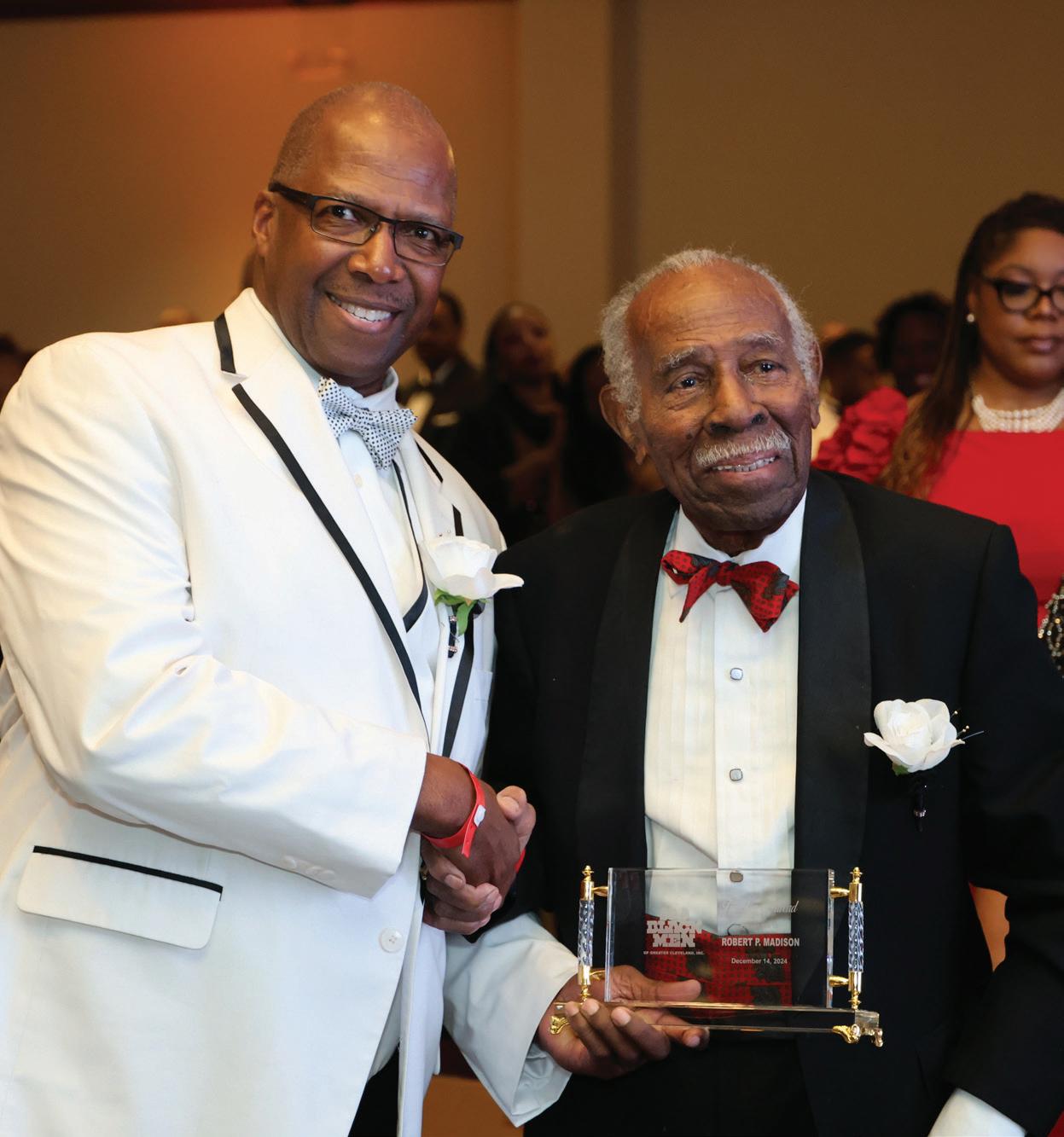
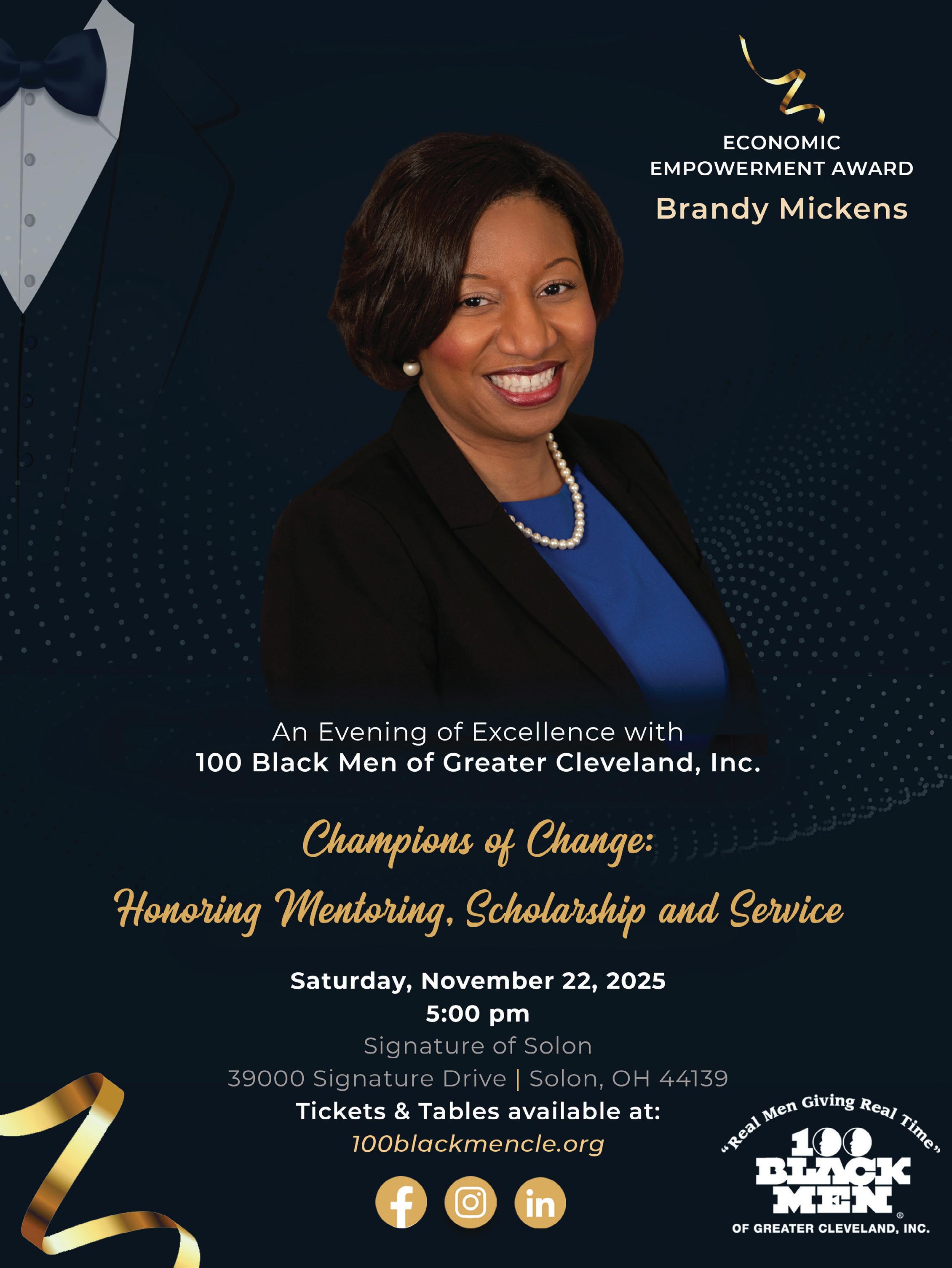


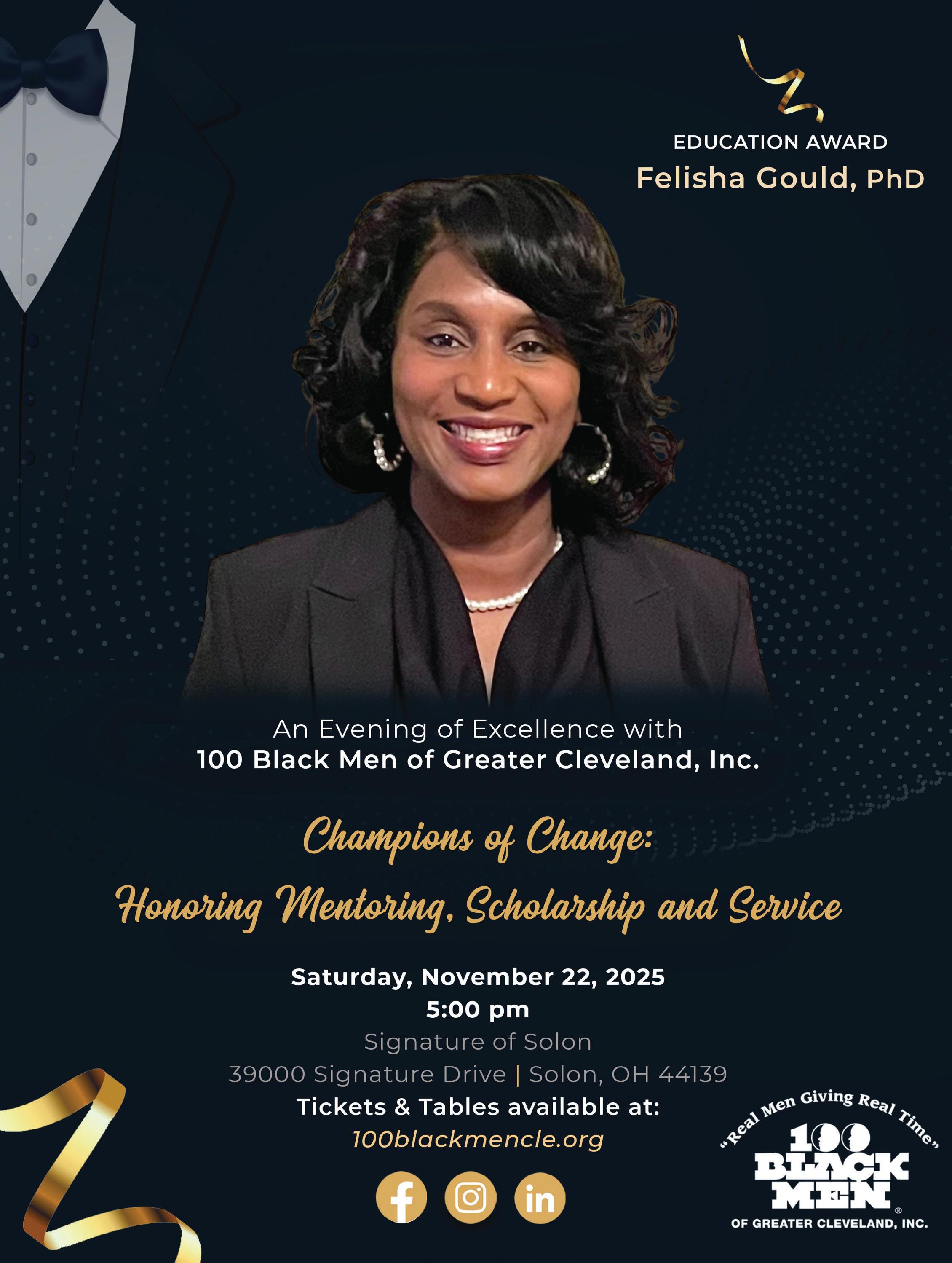
By James W. Wade III, Real Men Magazine – Special Feature on the
100 Black Men of Greater Cleveland, Inc.
Gala
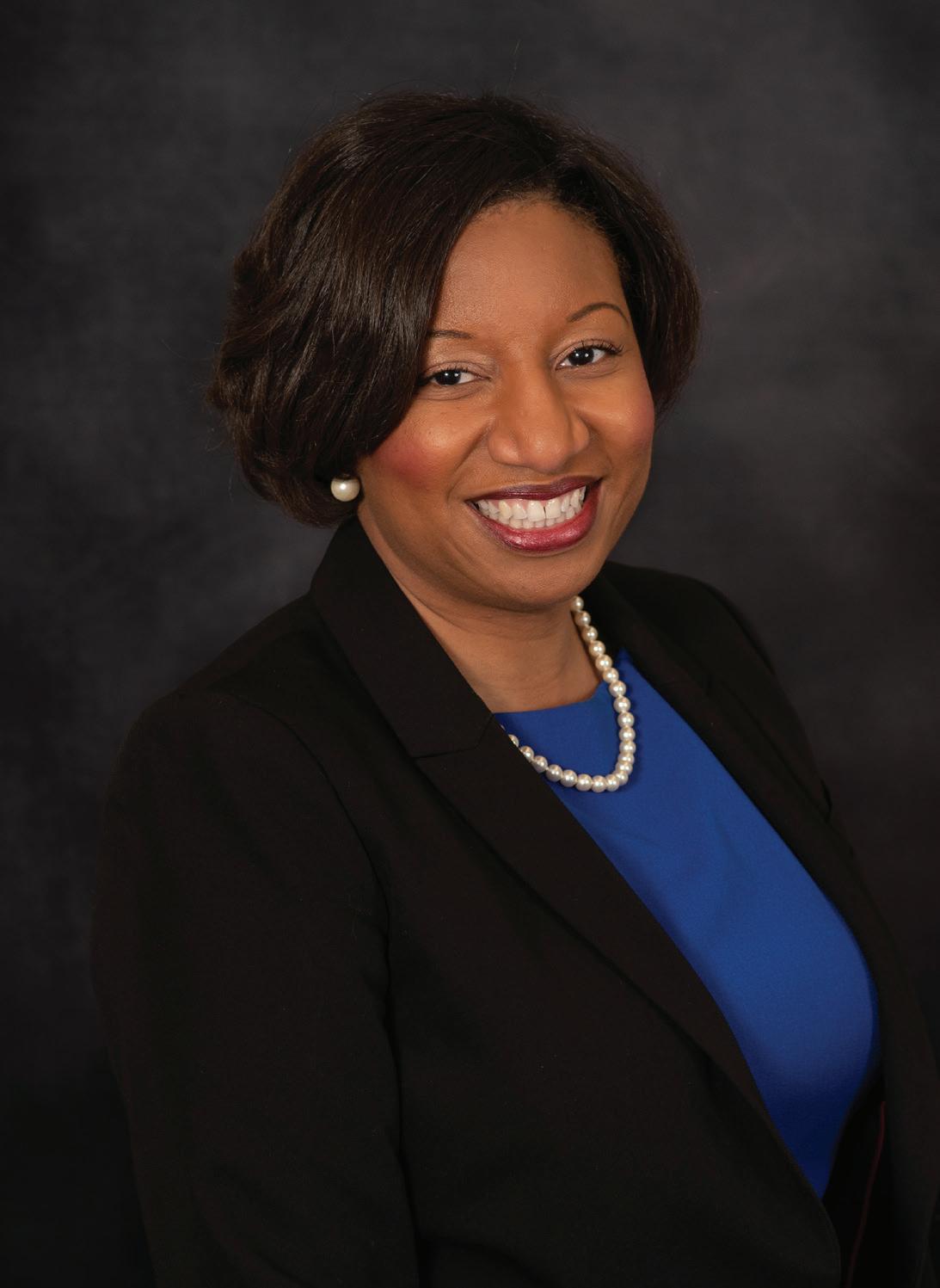
When Brandy Mickens walks into a room, she carries more than confidence—she carries purpose. Her calm strength, polished professionalism, and deep commitment to empowering others have made her one of the most respected voices in the financial services industry. This year, her passion and leadership have earned her the Economic Empowerment Award from the 100 Black Men of Greater Cleveland, Inc., an honor that celebrates excellence across the organization’s “Four for the Future” pillars: Mentorship, Education, Health & Wellness, and Economic Empowerment.
For more than a decade, the 100 Black Men of Greater Cleveland have recognized over 100 community leaders at their annual Gala— men and women whose lives reflect service, excellence, and commitment to the next generation. Brandy Mickens embodies all of that and more.
Brandy’s story begins in Dallas, Texas, where she graduated from Southern Methodist University before entering the financial services industry. It didn’t take long for her talent to shine. Early in her career, she helped develop the Retirement Benefits Group (RBG) in Texas— an initiative designed to address educators’ financial planning needs. Under her guidance, the group quickly rose to become the #1 RBG branch within Equitable Advisors.
“Educators are the heartbeat of our communities,” Brandy says. “Helping them secure their financial futures means investing in the generations they touch every day.” Within just two years, her results spoke volumes. She was named Dallas RBG Associate of the Year and received the Fast Start Award, achievements that marked her as a rising star in the industry. But Brandy’s success was never about personal gain—it was about impact. She built a personal practice of over 2,000 clients. She helped forge a partnership with one of Texas’s largest school districts, empowering teachers and staff to make confident financial decisions.
In 2014, Brandy’s leadership took center stage when she accepted a promotion to Vice President with Equitable Advisors. There, she coached and developed a team of highperforming financial professionals, guiding them toward excellence. Her leadership style—equal
parts strategic and compassionate—helped her team not only meet but exceed their clients’ goals. That same year, she was recognized as the #2 Territory Sales Manager in Hiring and Development across the entire company. Her leadership gift was further recognized when she was selected for Equitable’s Emerging Leaders Program from 2016 to 2018.
During that time, Brandy also lent her expertise to Equitable Advisors’ Black Advisor Field Advisory Council. This national group provided mentorship and guidance to Black financial advisors nationwide. “Representation matters,” she often says. “When young professionals see leaders who look like them, it changes what they believe is possible.”
In 2020, Brandy made history. She was appointed Executive Vice President of Equitable Advisors’ Mid-America Branch—becoming the first Black female EVP in the company’s history. She and her business partner now oversee offices in Ohio, Indiana, and Kentucky, managing hundreds of advisors and thousands of clients.
Her leadership has turned the branch into one of Equitable’s top 10 performing regions nationwide. Under her direction, they launched the Impact Day Program, encouraging employees to engage in meaningful community service. That same year, she received the CEO Award for her performance and leadership during one of the most challenging periods in recent memory.
Brandy’s list of accolades is both impressive and inspiring:
Crain’s Cleveland Notable in Finance (2022)
Equitable’s Cultural Leadership Award (2022)
Chief Diversity Officer Choice Award (2023)
Honor Guard Executive Committee Member (2022 & 2023)
Leadership Cleveland Class of 2023
She’s also taken her voice to national platforms, speaking at major conferences such as the National Black MBA Conference, Black Enterprise’s Women of Power Summit, and Finseca’s LAMP Conference, where she continues to champion inclusion, financial empowerment, and representation in leadership.
For all her professional success, Brandy’s true north lies in her commitment to service and faith. She is a proud member of Alpha Kappa Alpha Sorority, Inc., Jack and Jill of America, Inc., and serves on the boards of Intertwined and Finseca. Her involvement extends beyond titles—she mentors young professionals, helps women find confidence in financial independence, and actively supports programs that uplift underserved communities.
“Faith is the foundation of everything I do,” Brandy shares. “It keeps me grounded, grateful, and focused on helping others rise.” Brandy and her family—her husband, their bright and curious daughter, and their funloving pup—call Cleveland home. Her love for the city runs deep, and she continues to pour her energy into empowering others to dream bigger and plan boldly.
Click on the button below to purchase your 2025 Gala Ticket

The
The 100 Black Men of Greater Cleveland’s Saturday Academy is not just a program; it’s a catalyst for change. It inspires the next generation of leaders, shaping the future of our community. On a brisk Saturday morning at the Cuyahoga Community College Eastern Campus, the energy in the room was electric. Laptops were open, controllers in hand, and eyes focused—not just on the screens, but on the lessons unfolding behind them. This wasn’t just another gaming session; it was a masterclass in leadership, creativity, and opportunity.
The 100 Black Men of Greater Cleveland, Inc. Saturday Academy, a cornerstone program of the organization, hosted a special hybrid workshop titled “Intro to Games Culture, Live Streaming, and Esports.” Led by the innovative team at INFINITEQUE, this session gave over twenty students a hands-on introduction to the rapidly growing world of gaming, digital media, and technology entrepreneurship.
For years, the Saturday Academy has been at the heart of the 100 Black Men’s mission to help young African American men become Responsible, Respectable, and Ready to Lead. What sets us apart is our unique approach: through mentorship, education, and exposure to real-world experiences, we empower students to explore career paths, build character, and discover the power of community.
This month’s session with INFINITEQUE captured the spirit of innovation that defines the Saturday Academy. Founder Tristan Wheeler led the program virtually through
Twitch.TV/INFINITEQUE, while team members Ishmell O’Neal and Terrence Myhand facilitated the in-person component in Cleveland. Together, they created a dynamic hybrid experience that connected students locally and digitally in a shared learning environment.
What made this session stand out was its approach: using game culture as a bridge to teach real-world skills. Students learned the technical foundations of livestreaming—from camera setup and lighting, to sound design, broadcasting software, and digital production. But the lessons didn’t stop at technology.
The facilitators introduced participants to the business and creative sides of gaming: marketing, entrepreneurship, digital etiquette, and audience engagement. Students discovered how professional gamers and content creators use these same tools to build sustainable careers, emphasizing the importance of discipline, focus, and respect in all digital spaces.
“Livestreaming isn’t just about playing games,” Wheeler explained during the session. “It’s about communication, storytelling, and connecting with people in meaningful ways.”
As students actively competed against Wheeler in Street Fighter 6 live on stream, the matches became more than friendly competition—they became a platform for lessons on strategy, leadership, teamwork, and maintaining composure under pressure. Each round offered an opportunity to discuss real-world parallels: setting goals, learning from mistakes, and the value of preparation and focus.
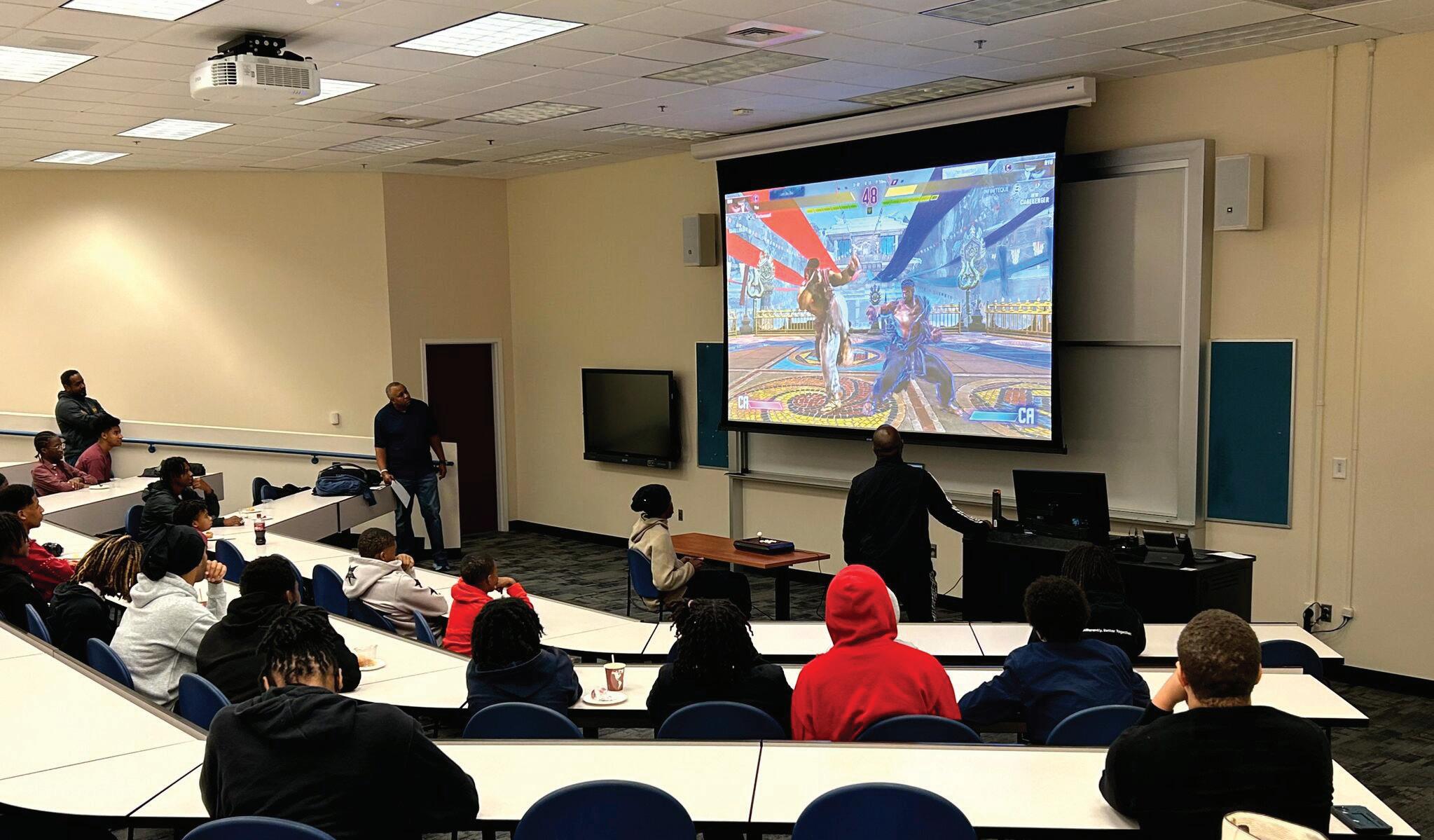
The beauty of the Saturday Academy lies in its unique ability to meet young people where they are—and then help them grow beyond it. For many of these students, gaming is a familiar passion. But through this program, they learned how that passion can evolve into professional pathways and personal growth.
“Moments like this remind us why the Saturday Academy exists,” said Grady Burrows, Director of Programs for the 100 Black Men of Greater Cleveland. “We’re here to give our young men the tools to succeed, not just in school, but in life. Whether it’s through technology, mentorship, or leadership development, we want them to see that they can turn their interests into opportunities.”
That vision was on full display during the session. Students were not only engaged but also deeply inspired. They asked insightful questions about careers in esports, video production, and marketing. They learned the importance of professionalism in digital spaces and the impact of representing themselves with integrity online—valuable lessons that go far beyond the screen.
For the 100 Black Men of Greater Cleveland, the Saturday Academy represents the organization’s mission in action. Founded on the guiding principles of the “Four for the Future” pillars—Mentoring, Education, Health & Wellness, and Economic Empowerment—the Academy is where these values come to life.
Every month, young men from across Greater Cleveland gather for workshops, seminars, and activities that challenge and inspire them. Sessions range from financial literacy and college preparation to technology, leadership development, and wellness. The goal is not only to educate but to build confidence and community.
The Saturday Academy provides access to role models—Black men who have walked the path before and are dedicated to helping the next generation navigate theirs. Through mentorship and exposure to new opportunities, participants gain the skills, discipline, and self-belief to reach their full potential.
This month’s partnership with INFINITEQUE represents precisely the kind of forwardthinking collaboration that keeps the Academy relevant in a rapidly changing world. By connecting gaming culture with education and entrepreneurship, the session expanded the students’ understanding of what’s possible.
INFINITEQUE’s mission—to empower communities through game culture, creative technology, and meaningful connection—aligns perfectly with the values of the 100 Black Men of Greater Cleveland. Together, they showed that leadership can be taught not just in classrooms or boardrooms, but anywhere young people are willing to learn. As the morning came to a close, one message rang clear: the future belongs to those who are curious, disciplined, and ready to lead. And with programs like the Saturday Academy, that future looks bright.
The 100 Black Men of Greater Cleveland, Inc. extends heartfelt thanks to INFINITEQUE for their professionalism, creativity, and passion. We also want to express our gratitude to the mentors, staff, and volunteers who make every Saturday a step toward excellence. Your support is invaluable, and we couldn’t do it without you.
Because when mentorship meets opportunity, transformation happens. And that’s what the Saturday Academy is all about—turning potential into purpose, and purpose into leadership.
Together, we mentor. Together, we serve. Together, we lead.
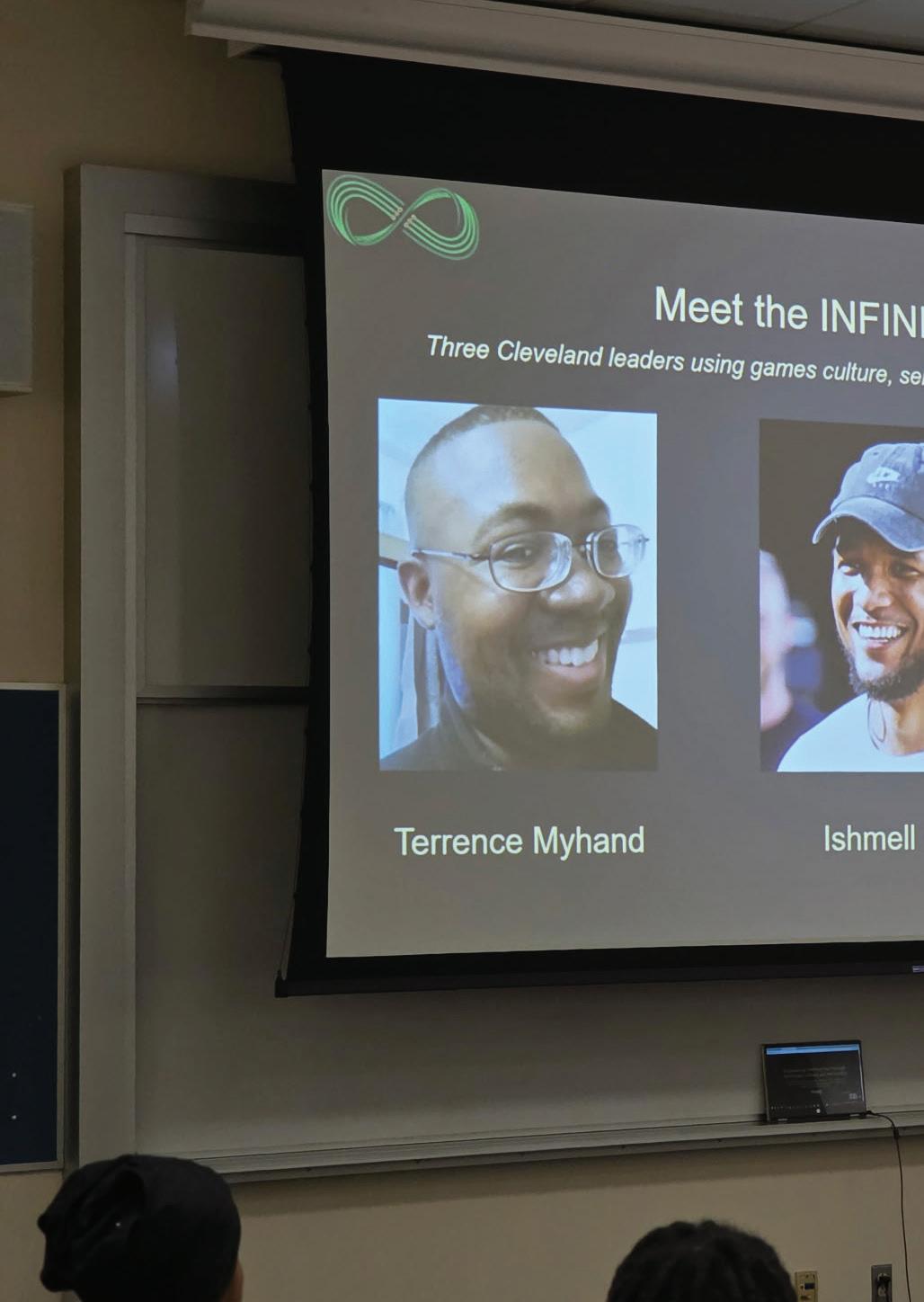
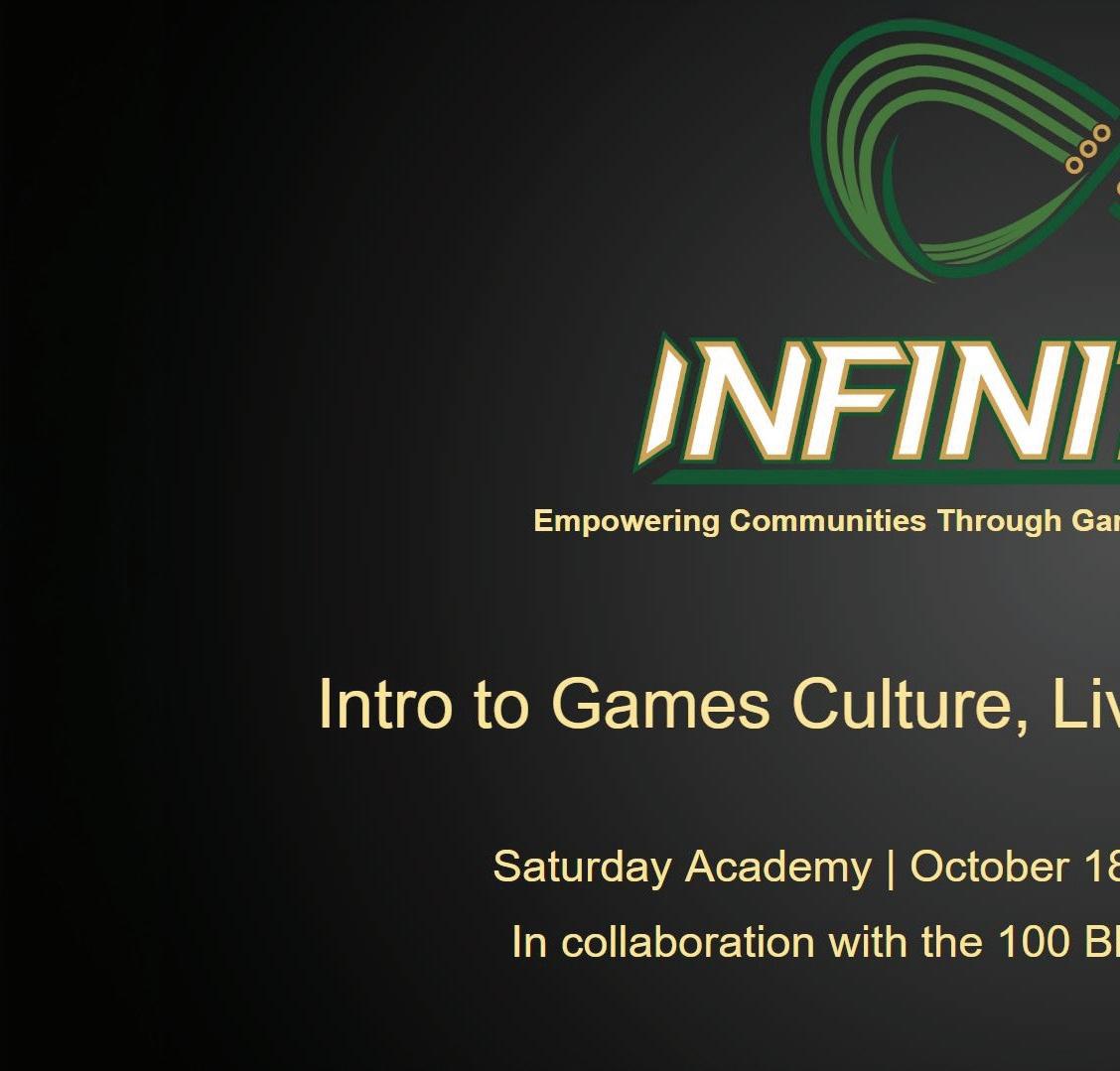
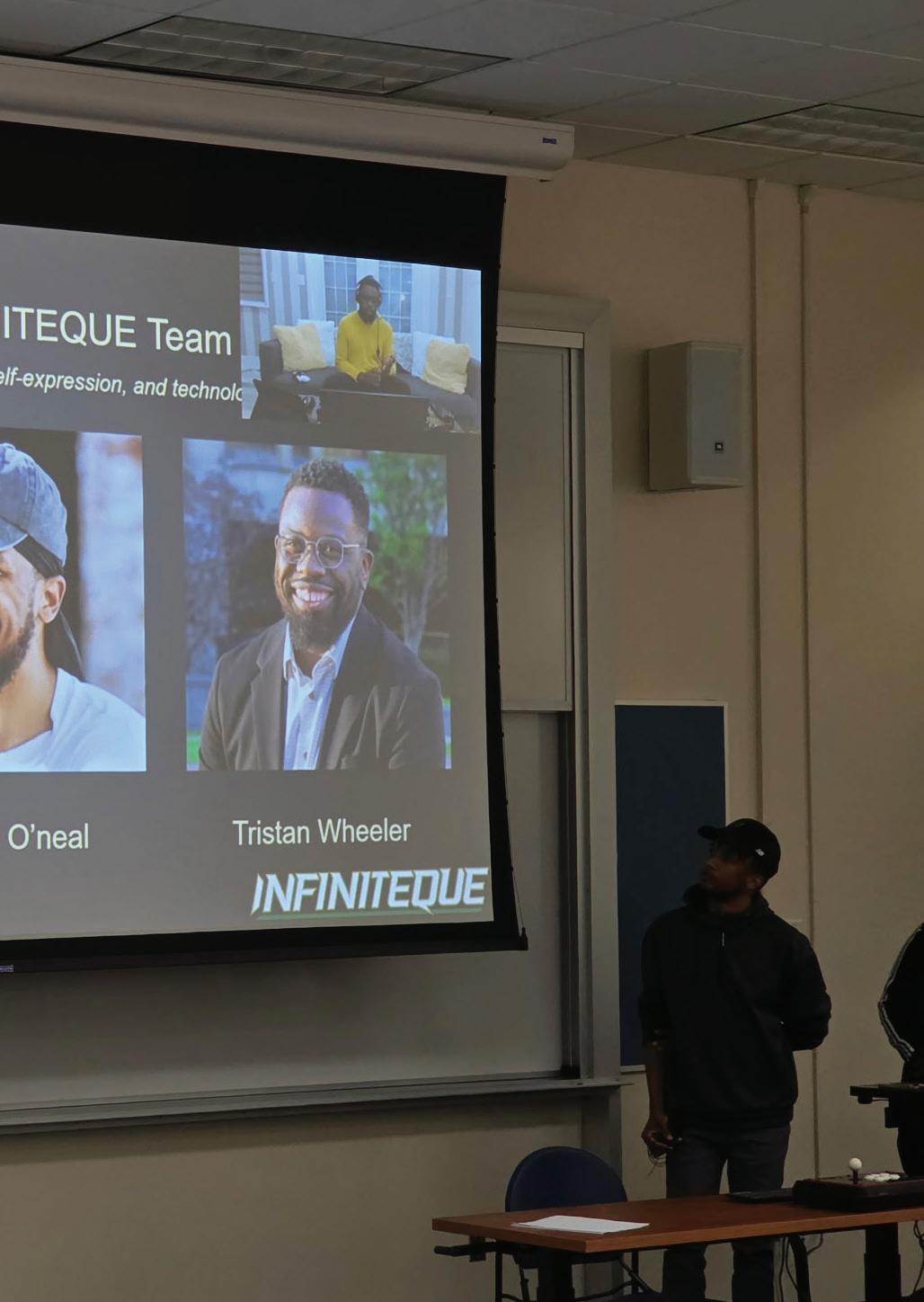
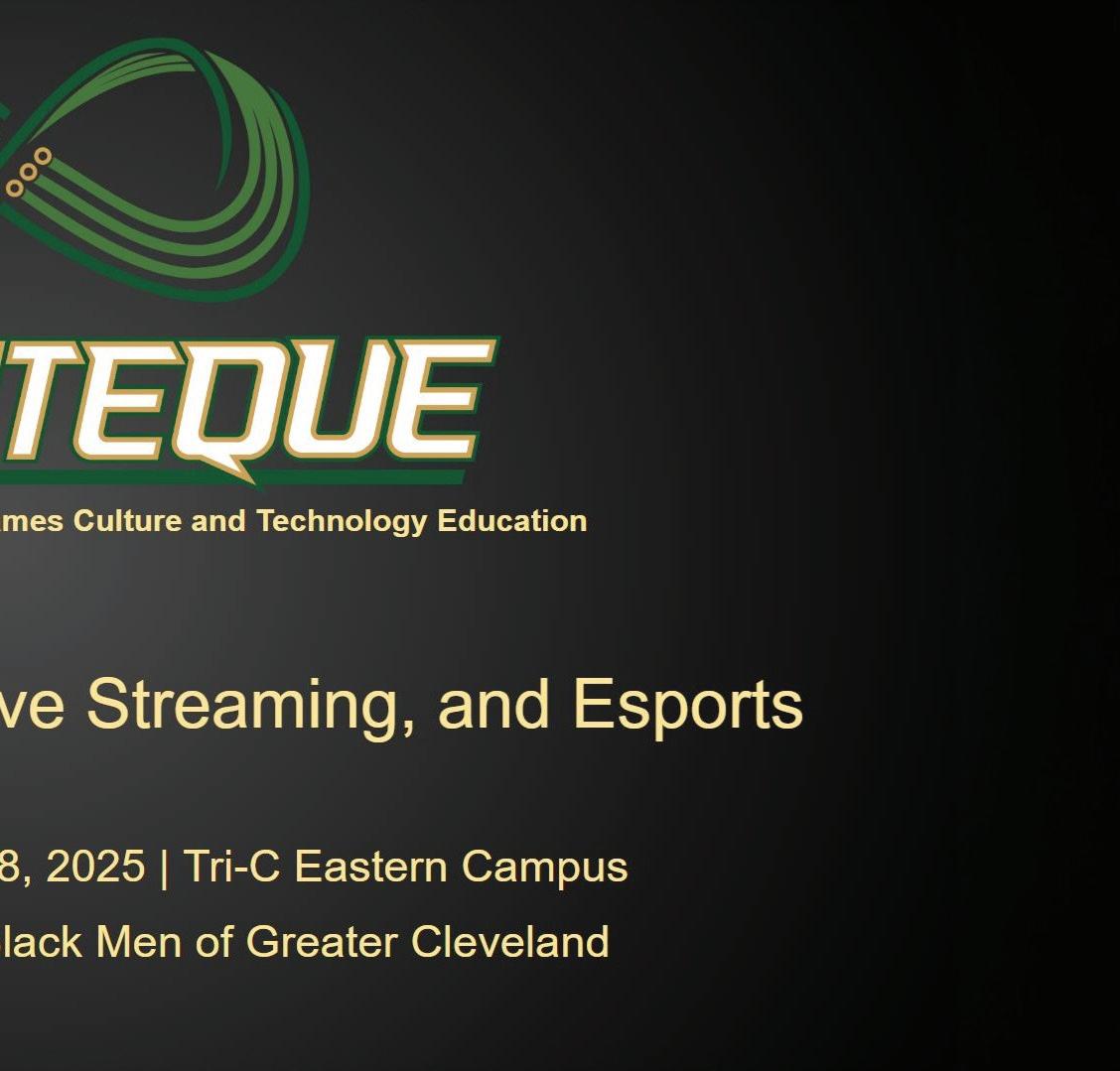

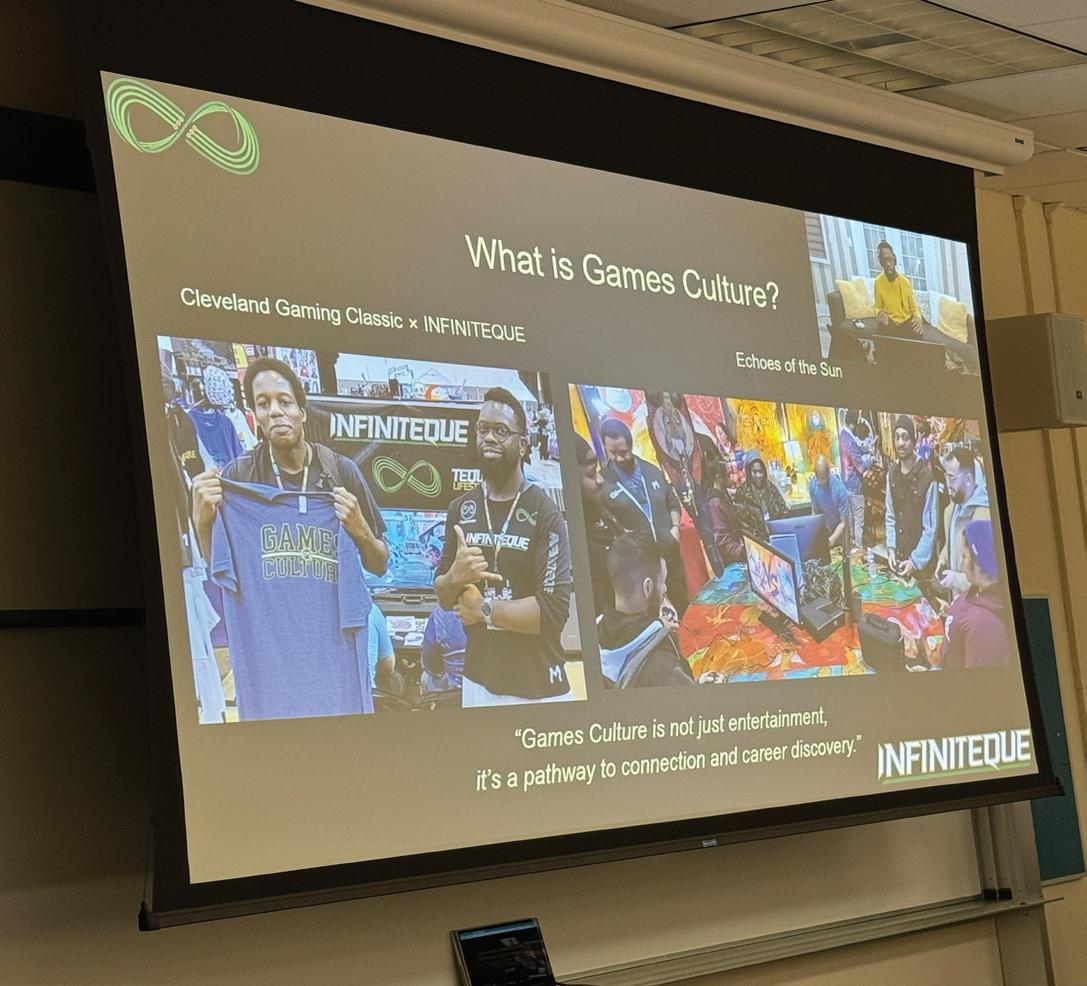
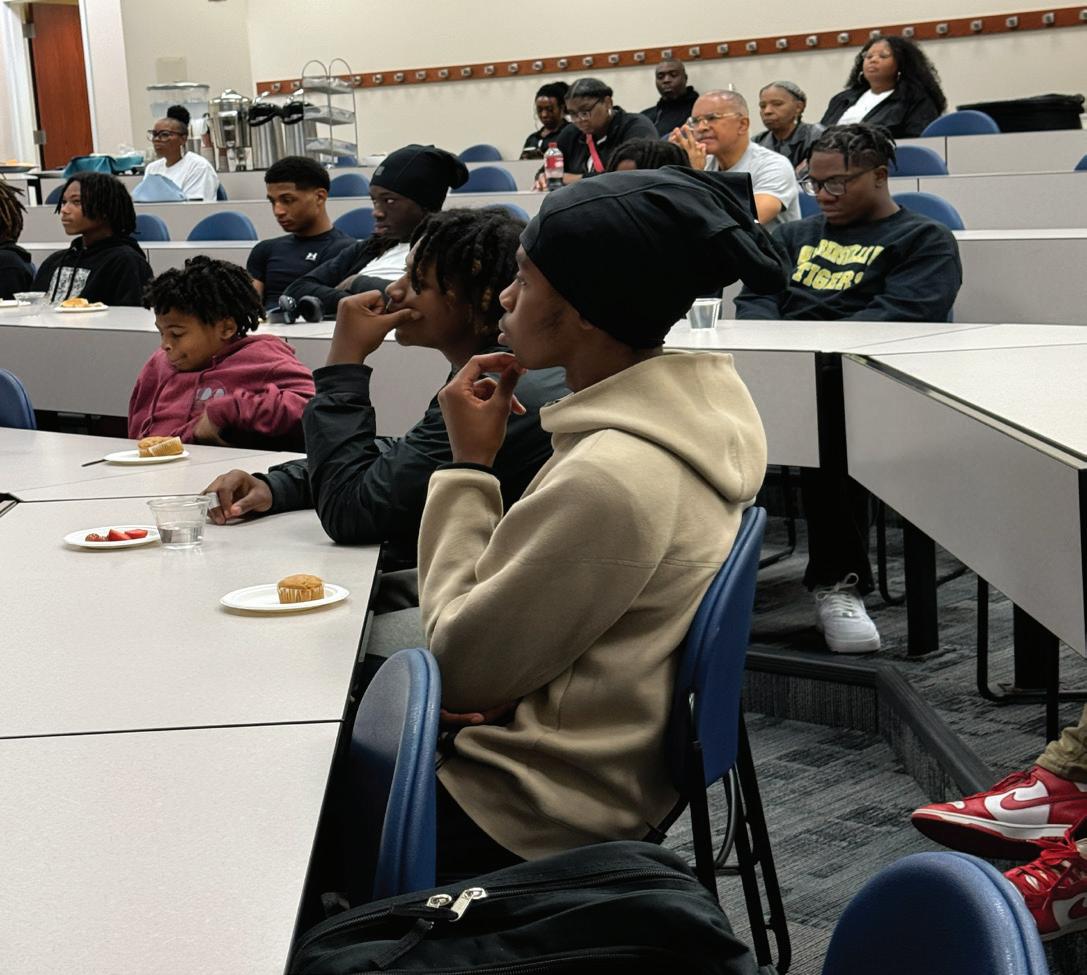

by Dr. Terry Echols
It has been more than 406 years ago since we recognized the first enslaved persons from Africa arrived in what is now known as the United States of America. With about 20 Africans arriving from aboard a ship called the White Lion, a Portuguese slave ship, they were immediately traded to the English colonist at Point Comfort or present-day Hampton, Virginia for food and supplies. This ‘transaction’ marked the beginning of African slavery in North America. However, an initial cohort of enslaved persons from Africa arrived about 117 years earlier in 1502 with Juan De Cordoba from Spain. And while the status of these now indentured servants regardless of their arrival date, the one constant which loomed large was education. Slaves were the labor force of the South, but slave ownership (and the dispossession and expulsion of Native Americans from their lands) was also the foundation upon which American white supremacy was constructed.
Slavery in the United States was a variable thing, in “constant flux, driven by the violent pursuit of ever-larger profits. The enslaved labor force of the United States, while stereotypically drawn as field labor to produce cash crops like sugar and cotton, performed nearly every type of skilled labor sought by the economy. But other trades were found to be in need such as blacksmiths, carpenters, shoemakers, barbers, boat builders, bricklayers, cooks, coopers, cotton mill engineers, dressmakers, iron furnace engineers,
milliners, millwrights, ministers, musicians, ostlers, plasterers, painters, seamstresses, stonemasons, and a bevy of other skilled trades were ‘in-demand’ but how could these tasks be performed without some form of education? Slave-owners and legislators alike were faced with whether the daunting task of educating these people would ensure that the free labor would continue to flourish, making slave-owners in the South some of the wealthiest people in North America. However, during the era of chattel slavery in the United States, the proper education of enslaved African Americans (with exception made for religious instruction) was highly discouraged and eventually made illegal in most of the Southern states.
Slave owners saw literacy as a threat to the institution of slavery and their financial investment in it; as a North Carolina statute stated: “Teaching slaves to read and write, tends to excite dissatisfaction in their minds, and to produce insurrection and rebellion.”
Literacy (the ability to read) enabled the enslaved to read the writings of people that were advocating for an end to slavery, (abolitionists). Learning to read also allowed slaves to learn that thousands of enslaved individuals had escaped, often with the assistance of the Underground Railroad, to safe refuges in the Northern states and Canada. Literacy also was believed to make the enslaved unhappy at best, insolent and sullen at worst. Nonetheless, both free and enslaved
African Americans continued to learn to read because of the sometimes-clandestine efforts of free African Americans, sympathetic whites, and informal schools that operated furtively during this period. In addition, slaves used storytelling, music, and crafts to pass along cultural traditions and other information. The end of slavery and, with it, the legal prohibition of slave education did not mean that education for former slaves or their descendants became widely available. Racial segregation in schools, de jure and then de facto, and inadequate funding of schools for African Americans, if they existed at all, continued into the twenty-first century.
Fast-forward, the case of Brown vs. Board of Education 1954 (Topeka, KS). The case originated in Topeka, Kansas, where Linda Brown, an African American girl, was denied admission to a white elementary school closer to her home. Instead, she had to travel a significant distance to attend a segregated black school. This situation led her father, Oliver Brown, along with other families, to file a class-action lawsuit against the Topeka Board of Education, arguing that the segregation violated the Equal Protection Clause of the Fourteenth Amendment. On May 17, 1954, the U.S. Supreme Court delivered a unanimous decision (9-0) stating that racial segregation in public schools was unconstitutional. Chief Justice Earl Warren wrote the opinion, emphasizing that “separate educational facilities are inherently unequal,” thus rejecting the “separate but equal” doctrine established in the earlier case of Plessy v. Ferguson (1896). The Court’s ruling effectively overturned the legal basis for racial segregation in public education and mandated the desegregation of schools across the United States.
And while many African Americans have overcome educational discrimination and inequalities to achieve endless possibilities, a new form of racial segregation within education now exists. Resegregation is the process of becoming, or causing a something to become, segregated (keeping people separate or
treating them differently according to race, sex, religion, etc.). Allowing students to attend the schools closest to them has resulted in wholesale resegregation by race and income levels. Re-segregation has left classrooms as racially divided as they were at the height of the civil rights movement. The nostalgia behind the slogan “Make America Great Again” has always provoked the obvious questions of just when America was great, and for whom. Early in the second Trump administration, we are getting the answer. Schools in the U.S. remain deeply divided along racial, ethnic and economic lines, even as studies show that the K-12 public school population is becoming more diverse. More than a third of students attend schools where 75% or more of those in attendance are of a single race or ethnicity, according to the U.S. Government Accountability Office’s most recent investigation into K-12 education. Conversely, significant gaps in test scores remain largely tied to poverty and local funding inequalities.
Despite the billions of dollars invested in desegregating public schools over the past few decades, school segregation has returned to the same level as it was in the 1960s. According to data collected by the Department of Education between 2022 and 2023, among 100,000 public schools across the country, about 83% of all Black public-school students and 82% of all Latino students attended a majority non-white school. At the same time, 75% of all white public-school students were enrolled in a majority-white school. We talk a lot about the importance of full integration to the health of our democracy but while students who continually are growing up in segregated environments or not interacting with people from different backgrounds, they will suffer. Unless something is done to improve school integration, millions of other students across the country will have to keep fighting for their education and the opportunities that come with it.

By James W. Wade III
As the holiday season approaches, we are reminded of one of life’s most potent forces — gratitude. More than a fleeting feeling, gratitude is a state of being that connects us, fuels compassion, and inspires service. It reminds us of where we’ve come from, who has supported us along the way, and why it is so important to reach back and lift others as we climb.
For the 100 Black Men of Greater Cleveland, Inc., the holidays are not only a time of joy and reflection but also a season of action and service. It is a time to live out our mission — to mentor, to serve, and to strengthen our community. Whether it’s donating groceries to families in need, volunteering with our youth
programs, or sharing time and wisdom with the next generation, this season reminds us that gratitude is best expressed through giving.
As 2025 comes to a close, we pause to reflect on how far we’ve come — as individuals, as an organization, and as a community united by a shared purpose. The 100 Black Men of Greater Cleveland, Inc. continues to grow in its impact and reach, touching the lives of countless young people and families through mentorship, education, and service.
This year, our programs — from the Saturday Academy to Well Connected Wednesdays and our Scholarship Fund — have opened doors of opportunity, fostered leadership, and built
bridges of understanding across our city. None of this would be possible without the dedication of our members, the resilience of our mentees, and the unwavering support of our partners and sponsors.
Each workshop, mentorship session, and scholarship awarded represents gratitude in action — the embodiment of our belief that when we lift others, we all rise. Our members continually demonstrate that leadership is not defined by title or position, but by service, integrity, and heart.
While the holiday season shines a special light on giving, our commitment to service extends far beyond December. Giving back is not a seasonal activity — it’s a way of life.
Throughout the year, the men of the 100 Black Men of Greater Cleveland dedicate their time and expertise to mentoring young men across the city. They teach financial literacy, health awareness, leadership skills, and personal responsibility. They show up — consistently, compassionately, and with purpose — because they understand that true transformation happens through relationships built on trust and example.
The Four for the Future pillars — Mentoring, Education, Health & Wellness, and Economic Empowerment — remain at the center of everything we do. These principles guide our programs and ensure that every young man we mentor has access not only to knowledge but to possibility. When we invest our time, wisdom, and resources in our youth, we create a ripple effect that extends into families, neighborhoods, and communities for generations to come.
Gratitude is powerful because it compels us to act. It reminds us that for every opportunity we’ve been given, there is someone else who could benefit from our help, encouragement, or guidance. This holiday season, as we gather with loved ones to celebrate, let us also remember those who may be struggling —
those who need a warm meal, a word of hope, or a reminder that they are not alone. The spirit of giving is not measured by how much we give, but by how deeply we care.
For our members, mentors, and supporters, gratitude means continuing the work — even when no one is watching. It means showing up for the young men who look to us for direction, for the families who depend on our programs, and for the community that believes in our mission.
The holidays remind us that our greatest gifts are not the ones we receive, but the ones we give. Each act of service, each mentoring conversation, each scholarship awarded, and each moment of encouragement creates lasting impact. These efforts embody the true essence of the 100 Black Men of Greater Cleveland, Inc.
As we look ahead to a new year filled with promise and potential, let us carry the spirit of gratitude and giving with us. Let us continue to build a legacy of leadership and compassion that empowers young men to become the leaders our community needs.
Because The Power of Gratitude and Giving Back is more than a message — it is the heart of who we are. It is why we mentor. It is why we serve. It is why we lead. Our shared commitment to these values is what unites us and drives us forward.
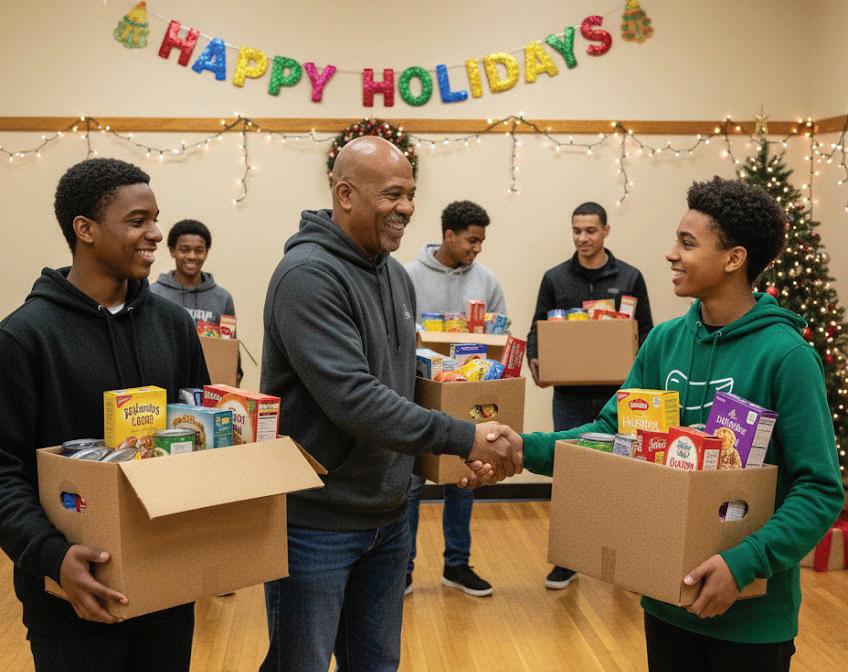
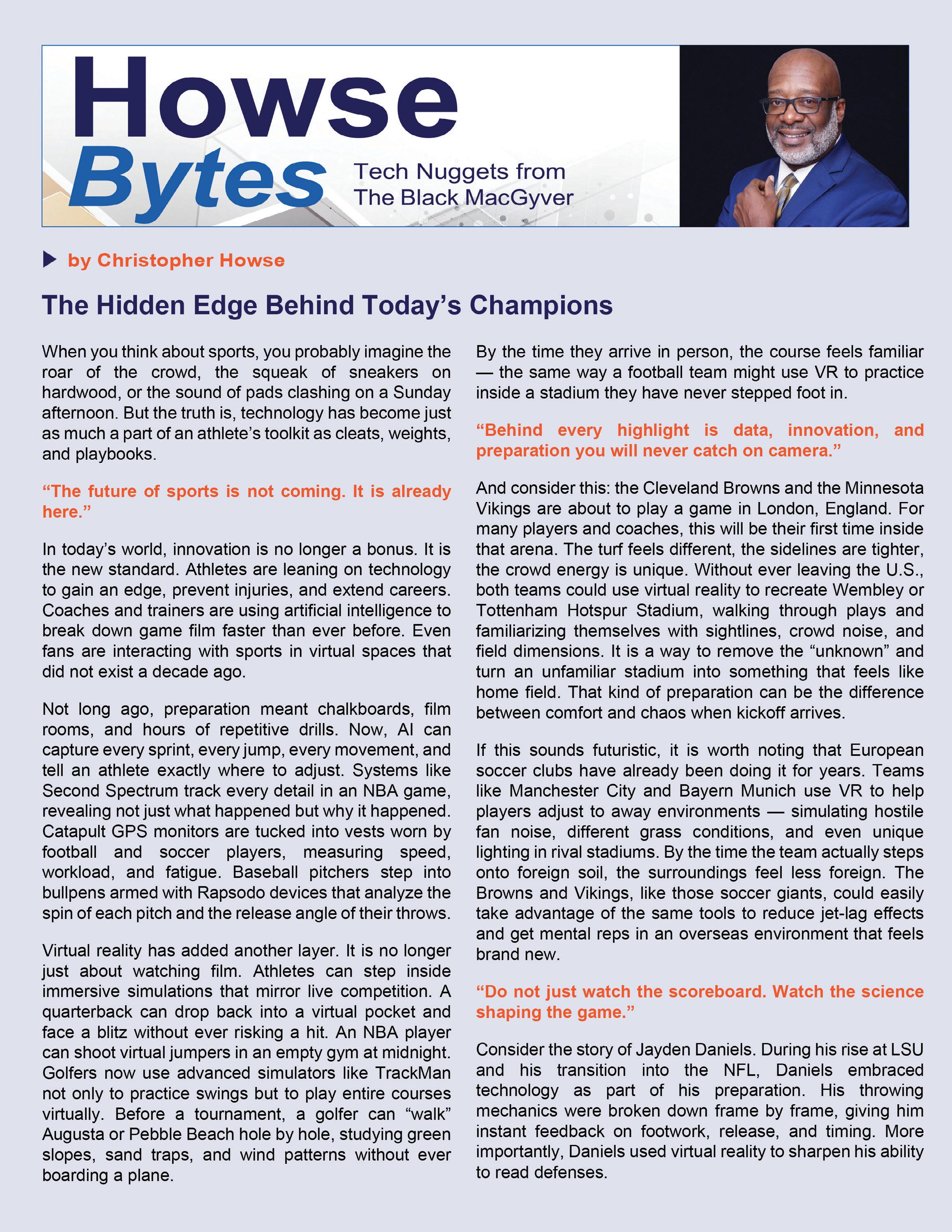










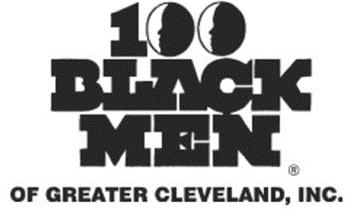






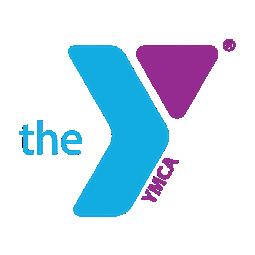




Since Lamont Dodson’s arrival at the 100 Black Men of Greater Cleveland, Inc. in 2021, he has been a living embodiment of the organization’s mission to uplift, mentor, and lead by example. As the Chief of Safety and Security for the Cleveland Metropolitan School District (CMSD), Dodson has taken on the immense responsibility of protecting more than 34,000 students and 4,000 employees across 90 educational buildings every single day, a testament to his unwavering commitment to the community.
“My mission is to provide a safe learning environment that fosters a brighter future for all students, staff, and our communities within the Cleveland Metropolitan School District,” Dodson said.
His role goes far beyond managing security — it’s about creating spaces where young people feel seen, supported, and empowered to learn without fear.
Being a law enforcement leader in today’s world is no easy task. For Dodson and his team, every day is a delicate balance of safety and compassion. “It’s not easy being a police officer or security professional in this day and time,” he reflected. “The landscape has changed. Public trust, social awareness, and the emotional needs of our students all require a different kind of leadership — one that blends firmness with empathy.” This emphasis on the challenges
they face will make the audience appreciate the complexity of their work.
Dodson and his department face complex realities: ensuring safety amid societal pressures, addressing mental health concerns, and responding to the evolving needs of schools and families. Yet, through it all, he remains steadfast in his belief that every interaction is an opportunity to build trust, understanding, and hope. This belief in the power of trust is a cornerstone of his leadership philosophy, making the audience appreciate its importance.
Joining 100 Black Men, Inc. has provided Dodson with another avenue to live that purpose. “Being part of this organization has allowed me to help develop future leaders by sharing my experiences and helping young men recognize and achieve their potential,” he said.
For him, the most rewarding part of mentoring is the mutual growth it fosters. “The trust that builds between mentors and mentees creates a two-way opportunity for learning. I grow just as much as they do.”
Through his service, both in the schools and in the community, Lamont Dodson continues to model what it means to lead with courage, compassion, and conviction — protecting Cleveland’s youth today while preparing its next generation of leaders for tomorrow.
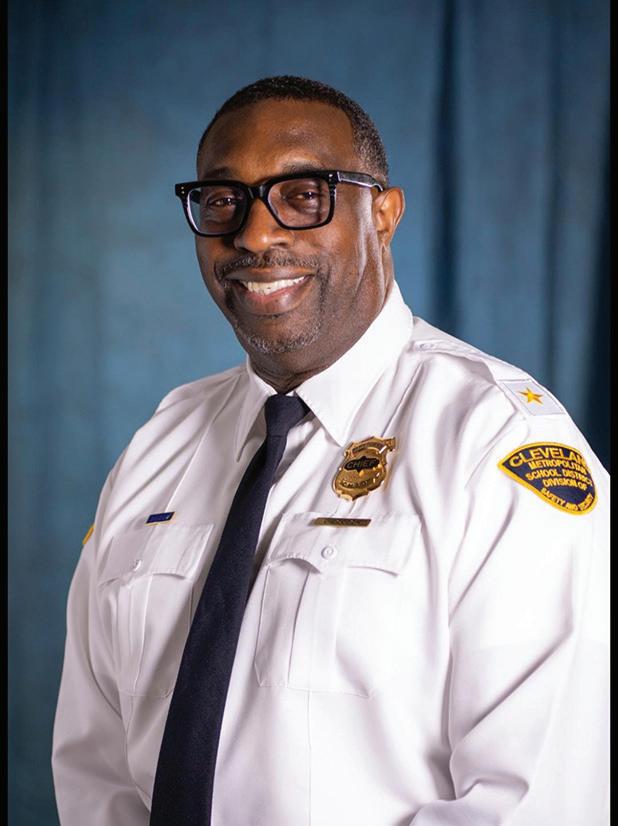

by Jayson Richardson
Exactly a decade ago, the Cavs were coming off an NBA Finals appearance, losing to the Golden St. Warriors in six games. In the 2015-2016 NBA season, the Cavs and Warriors seemed to be on a collision course toward playing each other again in a rematch. Except, the Warriors this time were a NBA record 73-win team. When the Cavs went down 3-1, it seemed it would be a formality the Warriors were going to become back-to-back champions. And then…. It happened.

The Cavs coming from being down 3-1 is and will always make that championship sweet. It is regarded as the best NBA Finals EVER. And for once, Cleveland isn’t on the losing end of an epic collapse. This time, Cleveland won. And became known as the only team to overcome a 3-1 deficit.
Here’s the thing. It’s been 10 years now. And the Cavs are once again a very VERY good team. One of the handful of teams that can win a championship. And it has be thinking and remembering the 2016 Finals.
No, this team does not have LeBron James. So, they are already at a disadvantage. But this team is still an excellent team that should come into this season with high expectations. Even without a LeBron James, this Cavs team has a loaded roster that Is one of the best in the league. Led by Donovan Mitchell and reigning DMVP, Evan Mobley, the Cavs have a team that has been disappointed in the playoffs in years past (similar to the 2015-16 Cavs). This team comes in with questions. Comes with uncertainty and people around the league wondering openly, “Can this team break through?” While we will have to wait until next summer to actually find out, this regular season is one of the most “formalities” we
will see. The Eastern conference is seemingly wide open as the Boston Celtics have lost Jayson Tatum, and the Indiana Pacers lost Tyrese Haliburton both to torn achilles tendons. The Cavs have made it to the second round each of the last two seasons. This should be the year they figure things out. This team won 64 games last year. The second-round loss to the Pacers was disappointing, just as losing in the Finals was disappointing for the Cavs 10 years ago.
This seems like the best opportunity for the Cavs to breakthrough. And what better time to do it than the 10-year reunion of the teams only championship? Last year the Cavs took the league by storm. Winning their first 15 games. This year, while they may not win 64 games, they are projected to record the most wins for the Eastern Conference. They are expected to win games. But they are also expected to falter in the playoffs. This is where they can make a move and change the narrative. 10 years later, it’s time again. To… Let Em Know!

